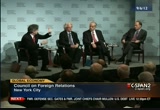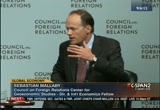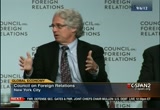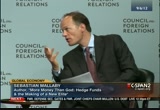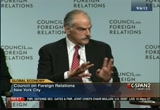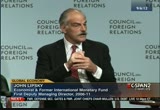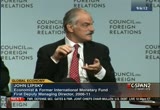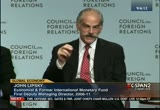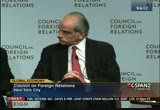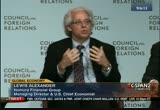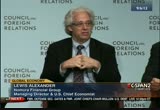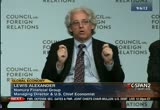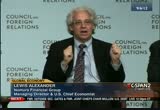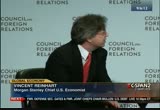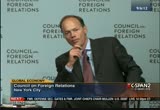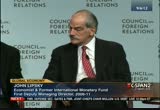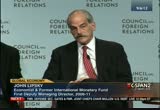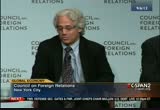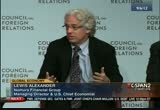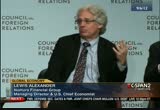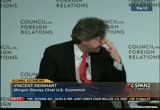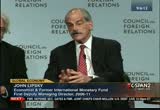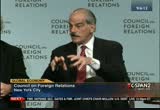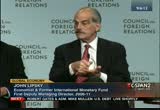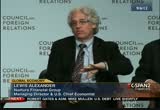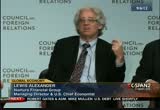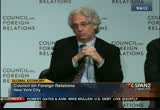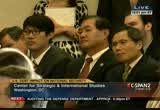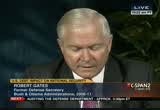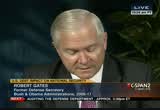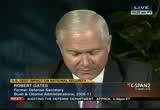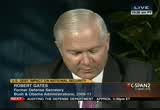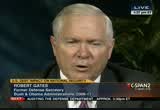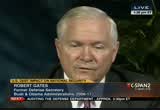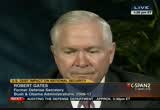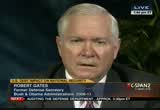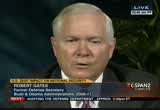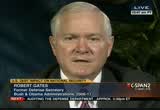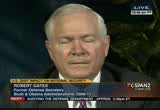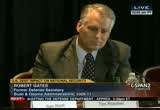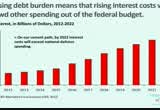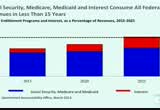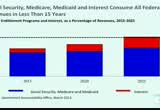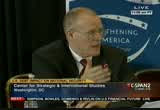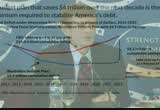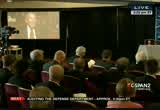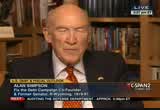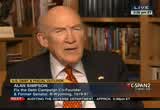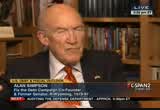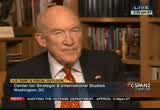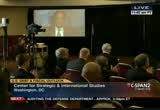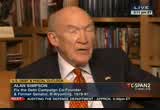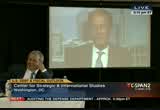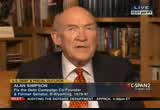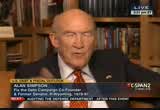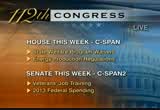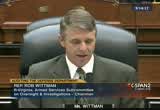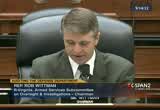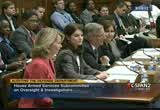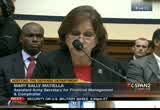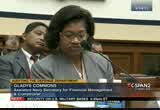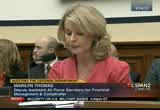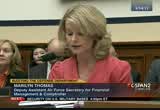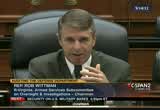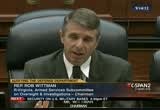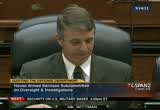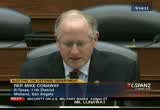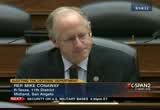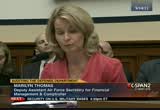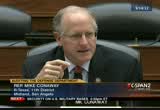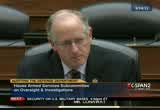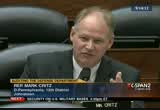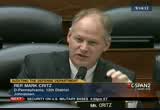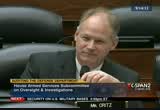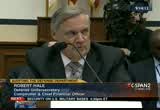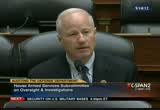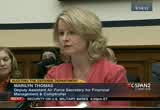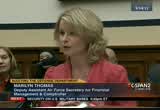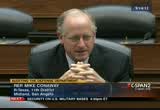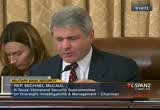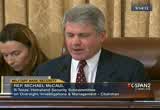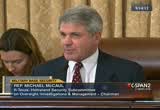tv U.S. Senate CSPAN September 17, 2012 12:00pm-5:00pm EDT
12:00 pm
you work on balance sheets, and so i read the last sentence to say those things are coming unless the data are surprisingly to the upside and the likelihood of that is low. .. >> actions at the central bank can have large effects when however markets are orderly, when traders have conviction, when there's a possibility of capital coming in from everywhere, they typically don't have much effect.
12:01 pm
now, the last point is this is a crisis in financial markets, financial institutions, it was also a crisis of economics and finance. our models don't work particularly well. the idea that you can assert one percentage point consequence of qe and then put it into one of those models and then grind out a solution that says there are that many more employed as a consequence is probably a stretch beyond what we're capable. [laughter] >> one more question loosely related to jackson hole on financial regulation which came up there. lewis, maybe for you. i guess the sort of most striking development in u.s. financial -- [inaudible] recently was this decision by is sec -- by the sec to back off money market funds. do you see that, you know, we've
12:02 pm
had some action on banks, shadow banks much, much less. money market funds are an essential part of the shadow banking system, and the sec's saying we can't do it. does this leave it up to the fsoc, or what happens next? >> no, i think this is an important issue that the fsoc has to address. in some ways they've made the case already, that money markets are a systemic issue. i think there's been a lot of consensus on that, some of it done by some people in the audience here. and i think now the fact that the sec has been unable to address this, one of the things fsoc was put into place to do was address these situations where you have a systemic issue that isn't being addressed by the primary regulator. and so now this is very much in the fsoc's agenda, i think it has to be. and there's, obviously, you know, a complicated set of questions about exactly how you
12:03 pm
do this, how, you know, what option is to, essentially, put it back to the sec by making a systemic designation for the activity as a whole, the first response of which would be to then put to us in on the sec to -- the onus on the sec to look at it again. you could look at money market funds as systemically important institutions themselves and have the fed take over a regular a la story role. but in some sense this is exactly the situation that, one of the situations that dodd-frank was designed to address. and so i think in some sense it is a unique opportunity for that whole structure to, essentially, show its worth. so i think this is an important issue. >> will the opportunity be taken? [laughter] your answer was they have to do it. will they do it? >> um, i'm no longer directly involved -- [laughter] so i think if you look at the, if you look at the first fsoc report, it's very clear that one of the principal systemic risk
12:04 pm
issues they identify is money market -- [inaudible] i think the situation they are in now with the sec having not acted, i think it demands action. and so, obviously, we're going to see who's, who wins the presidential election, who's controlling -- who's, essentially, chairing the fsoc going forward. i think by the, just by how long it takes to work these things through, it probably won't be tim geithner. if it was tim geithner, i feel pretty confident that they would address it given this is going to be probably on somebody else's watch i'm a little less confident, but i think the answer is, yes. >> just before we open up and invite members to join the conversation, i want to put one question to john about china. and that is, you know, china has sometimes had a couple of successes in terms of its sort of perceived participation in the economic community. one was right after the lehman brothers collapse. there have a global -- there was
12:05 pm
a global coordinated stimulus, and china contributed handsomely to that one. in terms of trade imbalances, china's trade imbalance has shrunk a lot. so these are two good things. but it does strike me now that we've been discussing what the central banks could do in europe and in the u.s., sweden has just cut this morning, i think. there's a lot of action around the world, and yet chinese growth by chinese standards have come down a lot, and policy action in china on some readings of it has been surprisingly cautious. do you think we're kind of coming up to a moment where china may be nudged by economic leaders in other countries saying, come on, you should do your share here to prop up global demand? >> interesting question. of course, a central factor, two
12:06 pm
key unknowns, one is how slow is slow in china. if you take a look, for example, at the recently-updated imf forecast, it's calling for, essentially, a soft landing, 8-8.5% growth in china. certainly that's not double digit, but that's not shabby either. and in the context of a relative success in rebalancing the economy toward stronger growth in domestic demand and less reliance on net exports because that's consistent at least in the imf forecast with the continued current account surplus under 3% which is, of course, dramatically down from where it was before the crisis. the second unknown -- but they say what's unknown is, is that right? is this a soft landing trajectory in which you'd have to say things are, obviously, there's difference in the prosperity of given sectors. we've seen the recent manufacturing data in china suggest a significant slowdown
12:07 pm
which would give pause and create a question of whether that soft landing view is too sanguine. and if so, i think there's a general sense that there are policy levers available to the chinese authorities if things are going much softer than they had anticipated, and if that is the case, then i suspect there will be not only external calls for policy action, but even more importantly domestic calls for action in the context of the second unknown which is the leadership change that is coming up in a matter of months. with the new leadership as i understand it, committed to a rather activist set of economic policies along the lines of the 12 five-year plan already adopted as formal policy, i'm sure most folks here would read down that list and say right, right, right, right, right. it's liberalization, market
12:08 pm
orientation, etc., reform of the fiscal system, reform of the banking system, let's see if it all gets done. but for right now the key question is how slow is slow. if this is a soft landing, then they're going to be fine. if it's worse than that, there certainly will be calls domestically for things to do. >> okay. let's see if there's any questions from the members. right here on the aisle. the microphone should be coming, so, please, speak directly into it and, um -- >> marja, i want today ask the panelists returning to europe, to what extent do you believe that labor market reform emanating from brussels will be a significant factor in the fix for europe's woes? >> well, that's a, that's a favorite of mine. i'll be real quick. i always call that vision, i call that the lisbon agenda fallacy, that the notion that market -- that labor market reforms begin with legal changes
12:09 pm
and then emanate to market changes. it gets things backwards. i think how labor legislation changes is companies become under pressure, they put pressure backwards on their work force for improved performance in the standard ways, and if that rubs up against legal constraints, then their pressure comes against, to the legal authorities, legislatures, to make the appropriate changes so things can get going. i know of very few times of which i can think of important changes coming first at the legislative level without already having created, without a swell of support from the let's call it the corporate or business sector. i think that is happening, and, of course, the place that is the poster child for that, that process was germany under, in the schroeder government. >> so i was on a panel, the title of which was the financial crisis in europe, a blessing in
12:10 pm
disguise. the theory being that market pressure would then lead to reforms, and that would be so growth enhancing that they would, that the crisis would pay for itself. my answer was if it's a disguise, a very good disguise. [laughter] >> right here. >> andrew gumlock, might lead into this next question which is really two approaches here. the u.s. approach which is ceans yang and easy money and the argument is there hasn't been enough spending, and the european approach which is really austrian, there's no credit available, and there's deflation forced upon most of the population. and the question is, which one -- if you're not an economist, rather financial historians -- which one is going to prove to have been a better approach, and what are the unintended consequences that you worry about in each? >> we'll get down the line here
12:11 pm
and have a vote from everybody. [laughter] >> so let -- >> pointing out people -- [inaudible] >> i don't think anybody's policy has won any gold stars. >> let's get to vince. >> let me give the answer that lewis won't give so, therefore, we'll have a diversity of opinion. [laughter] i wrote a paper with ken rogoff looking at the experience since the napoleonic war of 22 advanced economies, and here's the bottom line. episodes of debt overhangs where you have gross debt more than 90% are very possibly the growth discount on the order of 1.2% slower. those episodes are very long, median duration is 33 years, by the time you get out of it, the level of gdp is a quarter lower than it had been if you ever got there, and it isn't always about
12:12 pm
rates. 11 out of the 26 cases, it wasn't market discipline forcing that contraction, it's something else. so, um, i understand that the unemployment rate is high in many advanced economies, unacceptably high. we need more policy accommodation. we have to do that in a way that gets us to a path for which we have, consolidate our fiscal accounts. >> if you frame it as u.s. versus europe, one of the crucial, crucial, crucial distinctions is, of course, the u.s. benefits of the safe haven. and so in this some sense we have the flexibility to deal with vince's problem over time in a away that other countries don't. if you compare us to greece, right, we have the luxury of time in a way that they don't. and i think that that drives you to different answers. now, the obvious point that, you know, in some sense the work that vince just described
12:13 pm
creates for the u.s. is you can't do this forever, you do have to pay attention in the long run. there's got to be some sort of solution that strikes the balance between those two things is, i think, important. but if you look at where the fiscal debate is in the u.s. at this moment, what's striking about it is it's only about the pace of consolidation. in the some sense, the keynesian side of that debate is, frankly, not in the play at the moment. it really is the question of how fast we're going to do consolidation, not whether or not we're going to do stimulus now and consolidation later. and i think that certainly effects me as i'm a forecaster, but we, you know, the united states is in this sort of very different position. you might argue japan, somewhat different circumstances, very high domestic savings rate, managed to sort of face a different set of constraints in that environment, but i ultimately agree with vince that, like, you have to deal with this problem, and you can't
12:14 pm
get around it. but we're operating under somewhat different constraints. >> john? >> yeah. which is everything's fine until it's not fine. but -- >> i didn't say not -- [laughter] >> the point is this time is different. [laughter] >> anyway, of course -- >> don't want to go there, vince? >> with yeah. >> all this precluding vince and ken's study was music to the ears of the folks at the imf who have had this view for some time that this is how these situations have to be, have to be dealt with. but certainly lew is right, everything doesn't have to get fixed today, but it's got to get fixed, and it's been the key, and the key is that it has to be that people have to have confidence that it will be fixed, and that's the tricky
12:15 pm
part; namely, how do you demonstrate convincingly that even though you're not fixing everything at once because you can't, that you will fix it over time. >> specifically about fiscal deficits -- >> among other things. >> can i -- >> yeah, go ahead. >> i mean, i think one of the, one of the things which i think is important to think through when you look at the u.s. right now is if you look at the history of how we've dealt with these things, to some extent we went through one of these cycles in the late '80s and early '90s. we got our fiscal accounts on what seemed like an unsustainable path in the late '80s, it became a retail political issue. it generated, among other things, ross perot running for president. now, that ultimately led to a set of political choices that put us on the path of where we were in the late '90s which was surpluses. there were other things going on as well, so it wasn't all policy choices. >> right. >> but the point i would make is retail politics in the u.s. drove you to a solution. i would argue we're in the same
12:16 pm
place. what is more than anything else driving fiscal policy in the united states right now is the tea party. right? it's driving it in the sense that they are saying we are on an unsustainable path, and we have to fix it now regardless of the sort of keynesian concerns. now, it's a -- we have a political system in which it is hard to get things done by design. our system was designed to make it hard. that's what checks and balances mean. so it is a messy process for us to get to that consolidated path. and, yes, i totally agree with you, john, there's got to be confidence. but i would argue that ought to give one confidence is what's driving this is not market pressure, it's not the imf imposing on it -- >> right. >> -- it is politics on the ground. and so, yes, the next six months is going to be incredibly messy. i think there's a decent chance we're going to go right off the cliff because people aren't going to be able to make a, reach an agreement at the end,
12:17 pm
right? but i think the thing to remember is what's driving us more than anything else is retail politics that wants to get us on the consolidated path. and i think when you think in the long run context, that's the thing that ought to give one some degree of confidence that we're going to ultimately fix this problem. >> so there are two constraints on fiscal policy. there's market discipline, and there's voter discipline. when we talk about market discipline, it is like service in the military; long periods of tedium and intense bouts of panic. to the point greek spreads three years ago said there's no fiscal problem. but i think lewis is exactly right. locally, there's no market discipline on the united states. there is voter discipline, that's why we're seeing change. thing to remember about voter discipline is it's mostly incoherent. [laughter] you look, everybody hates deficits and debt, everybody loves their own programs. if you do the detailed surveys and ask how would you fix the
12:18 pm
problem, the first answer is cut foreign aid. that's, what, two orders of magnitude off to deal with the problem. politics is about channeling voter anger to an appropriate end. what i compare this, the u.s. system is since we continually generate voter discipline like the little circular rumba that cleans my living room floor. it has no intelligence, it bounces off the walls, eventually gets to the point where it covers everything. we'll get to the right place -- [laughter] we'll get to the right place. it will take longer than it would if there was an intelligence guiding the process. so in that sense we're not like japan. there's both an absence of voter discipline and market discipline. but it's going to be a census. >> the kennedy school political economy will still have the floor-polishing theory in u.s. decision making.
12:19 pm
[laughter] anything more from the members? he's got a comment or a question. otherwise i can see the slow moving here. john? >> yeah. i could add something to what was said which is impact. there are, even though this vision of the rumba may be not completely comforting in the short run, that actually there are a number of factors that seem quite positive for the u.s. economy in the medium term, certainly. the energy outlook which is, it's very, it's very striking that near term you have very high energy prices and medium term the, all the experts tell you that the outlook for energy costs in the united states is differentially favorable. not only favorable in the absent sense, but favorable in a relative sense. and at the same time, we've seen the corporate sector, obviously, do significant deleveraging, banking system significant deleveraging, the underpinnings,
12:20 pm
it seems the financial underpinnings of the corporate sector are very sound. it's interesting to me that people are talking about the paralysis of uncertainty, a press favorite. in fact, as we all know, business spending on equipment and software has actually grown at a solid pace, and if everybody was paralyzed with uncertainty, sort of hard to understand how that was happening. and at the same time, even though we still have questions about the near term outlook in the housing sector, i think it's obvious the trend rate of new household formation in the u.s. is someplace between a million and two million a year, who knows? but since 2008 we've been producing about conceivably half the new units that are necessary to fill sort of the generic demand trend. all of that suggests that there's, there ought to be if we can get the impediments out of the way, that the medium-term
12:21 pm
outlook ought to be quite satisfactory. >> any questions from the membership? i have one. i see one over there. okay. byron. >> it doesn't seem -- byron wean, blackstone. it doesn't seem to me that we're going to solve this problem without very significant structural changes on both sides of the atlantic. there's no evidence that the democrats are going to be sufficiently aggressive in cutting entitlements, and there's no evidence that the republicans are going to be sufficiently aggressive in raising taxes. and we're not going to solve the budget deficit problem without doing both, or at least i don't think so. so what -- it seems to me that you as a panel are too complacent about this, you know, that you think that eventually, you know, we'll solve the problems because we always seem to. but there's, there's evidence that we're in much more trouble than we've ever been before. we had $6 trillion in debt in
12:22 pm
2000, we have $16 trillion in debt now. it's going up at a trillion dollars -- more than a trillion dollars a year. and congress won't do anything about it because we can borrow money so cheaply. they won't do anything about it, in my opinion, until interest rates go up. but by then it'll be too late. so i'm worried there aren't enough structural, there isn't a motivation for structural change. and the same thing is going on in europe. all they're doing is temporarily solving the problem there by issue -- by providing funds. they aren't really dealing with the structural issues. they talk about it, but if you look at what's going on in italy and spain, it's just not enough. so my feeling is you're too complacent. am i being too critical? [laughter] >> um, i'm not going to -- i think that was mainly directed at me and not my two colleagues who were, i think, more -- less
12:23 pm
complacent than i was. [laughter] first of all, let me agree that the circumstances are much worse than they were in the 1980s, and the concerns of both these guys about, right, if we were to get to the point where the market paid attention to long-run fiscal sustainability in the united states, that is a very big deal that none of us wallets to deal with, number one. number two, um, there is no question that we are headed in a kind of a political environment that is very contentious and very partisan with both sides taking on positions that are hard to move. but i think i would point to the following signs for somewhat more optimism. first of all, it's clear from all the reporting that the president and speaker boehner came pretty close to a significant deal last summer. that included, um, significant changes on entitlements on the part of the president and some revenues on the part of the republicans. now, that, you know, that
12:24 pm
obviously that deal did not come forward, but there is a basis for some optimism that they worked through the details closely enough to sort of think about those options. um, second of all, i take as progress the fact that, um, chairman ryan has put forward a budget that has actually involved going out and getting the congress to vote on spending cuts that are, you know, nontrivial, right? they're not necessarily what i would choose, but the fact that they've taken the action of actually forcing the congress to vote on those things is a sign of some movement in this area. um, i think this is something that is going to take multiple years to get us there, and i would come back to the notion that ultimately what is driving us is a dissatisfaction on the part of the american voters of the fiscal path we are on. and that that is going to be reflected, as it has been already reflected through our
12:25 pm
elections. that is, i think, how i take, you know, what happened in 2010 more than anything else. and so i think you're going to see that reflected going forward. and so, um, look, one of the things i've spent a fair amount of time thinking about is systemic risk and the sort of mother of all systemic risk is if you get to the point where you see some transition away from u.s. treasuries as the safe haven asset, there is nothing that tops that, in my mind, as a systemic risk. ..
12:26 pm
and i think that my statement isn't about any local optimism. i think it is a mistake to undercount a market economy historically has been very resilient. and so, historically we've risen to the challenges. we have to make as a nation, three realizations. number one, the average tax rate has to go go up. number two, you don't necessarily get the average tax rate up by raising marginal tax rates in an inefficient tax system. number three, the biggest
12:27 pm
overvalued asset in the world right now is the net present value of entitlements that our citizens think they're going to get because we don't have a fiscal system that can actually deliver that. those are three really hard things. it isn't obvious to me that we have a political system that generates those solutions really fast. if you want to look for good news. the good news this election most likely will be contested on two distinct visions of fiscal policy. the even better news we are terrible at delivering fiscal policy right now. we're so far inside the inefficient frontier of fiscal policy that any which way is up. so it is possible to define two distinct, coherent, credible, visions for what we should do that get us to a better place. they differ on your view on the size of the government, the progressive tax system, the role of the safety net
12:28 pm
but we can do it and we just have to, we'll get there eventually. it may wind up being very, very costly and it could be a close run thing. >> okay. here's my bit. the, look, it seems to me that there are several factors here that obviously there are a set of downside risks here, downside risks in europe, particularly evident in europe but, it seems to me, first of all, there is a notion, public would say it, popular notion, that the rise in debt and deficit in the united states was due almost entirely to discretionary decisions by the u.s. government, which is simply not the case. most of the rise in debt and deficit reflects the weak performance of the economy, allic stablizers. at the same time even though federal, and as a result, the deficit ought to be geared towards a reform
12:29 pm
mallization of economy. in other words it will improve if the economy in fact improves. i can give you a couple reasons why you think that is a still likely. there is a window, at the same time, i would say there is a real window opportunity of improvement in fiscal policy if it is not met is a real danger and it is easy to define. federal debt, debt-to-gdp increased 50% since the fiscal crisis. federal percentage of the debt service has increased by zero since the beginning of the crisis. this is not going to last. forget anybody losing faith in treasurys. if there's a reform alization ever the economy and reform mallization of real interest rates, gdp will go up 2, 2 1/2% in the next administration. so if they don't make progress toward improving the medium term fiscal outlook in the next two
12:30 pm
years it will come back and eat them alive because they're going to be struggling to hold the deficit down just paying the debt. this isn't going to go away. and myron, you may be right, that congress is, everyone's too my onic to do anything about it. -- my jaapic. in europe i would say, the short version is there a plan? the answer yes, there is a explicit plan they should be doing. what you're basically seeing is an argument who's going to pay and i just don't think it makes sense or reasonable to expect that while they argue about who will pay the bill they will go over the cliff. i call it the wiley e. coyote moment. it could happen. could happen. but as you can see, some decisions have been made in europe over the past few months that a year ago would have seemed impossible.
12:31 pm
now it doesn't mean it is going to succeed but i think there is reason for thinking the heavy lifting that we started out with vince talking about is in fact going to get done. >> one more question. i saw somebody earlier. >> hi. david malpass. we haven't talked about taxes so we have a tax cliff at year-end. as vince says, average versus marginal rates. does that inevitably get us to consumption taxes as the population ages? >> going to try that? >> i don't think inevitably. that is obviously one solution. i think just, following up on john's list of good things, one of the things i'm encouraged by as all the discussion that is discussion going on about fundamental tax reform that is part of but really independent of the fiscal story. and i, i think we have a tax code that is very inefficient. i think you have had, the president came out with a white paper supporting
12:32 pm
essentially revenue neutral corporate tax reform. you've got the house doing hearings on that now which is the necessary preparatory work. so even in a, even in a kind of a world where obama gets reelected and you have a reblican congress i think there is a decent chance we'll get fundamental tax reform. i would add that onto the list of john's things. does that, do we ultimately get to a consumption tax? i, i'm an economist so i can certainly make the argument why we're there. i don't think that is part of the debate now. we're a fair way away from that but we'll see. i do think, one of the risks, which i think people are sort of discounting is the notion that for essentially bargaining and strategic reasons we will go off the fiscal cliff in sense that the advantage of doing that then the tax rates reset to where they were at the beginning of the bush administration. then you could have a
12:33 pm
different debate which is a debate about let's do a big tax reform that includes cutting taxes for most people. and that is a more attractive debate for both sides to have than the current one. and so, and, you know, there is a lot of work being done, what's the economic consequences of going off the cliff. a lot depend whether or not you think it is permanent or temporary. if you think you roll into jan 1 with no deal and all those things are there forever, that is very bad world. i would argue that is bad assumption. if we go off the cliff there will be a set of negotiations that will get us a big tax bill earlier in the year that will -- i don't think that will include a consumption tax would be my prediction but i do think that actually tax reform over the next year is one of the sort of potential up sides. >> let me say -- >> consumption tax layered on top of an already inefficient tax system
12:34 pm
should be very frightening. a consumption tax part of a total reform should be welcomed. >> let me wrap this up with asking for one word answer from each of you. [laughter] in three-years time how many members of eurozone will there be? you're allowed to say 17, 16 or fewer? john. >> 17. >> 16 or fewer. >> fewer. >> okay. consensus. thank you very much. [applause] >> we'll take you live now to the center for strategic and international studies in washington, d.c. former defense secretary robert gates, former joint chiefs of staff chairman admiral mike mullen will talk about national security implementations and of the
12:35 pm
u.s. debt. coming up later president obama's debt reduction commission cochairs, erskine bowles and alan simpson will join former white house budget director alice rivlin and senate budget, former senate budget committee chairman pete domenici. they are going to discuss various bipartisan plans to cut the debt. this is just beginning. you're watching live coverage here on c-span2. >> we're facing the most perilous time from a national security standpoint in my memory but the threat is not outside the united states. it's inside. it is our inability to get our act together, is in my view the greatest risk we face from a national security standpoint. we want to drill in on this today, and i want to say a special thank you to these remarkable leaders who have decided, talking with chairman gray and he said that he has been spending too much time on the outside avoiding trouble. now he realizes the country needs him to get in the middle of it to make trouble. i'm very grateful he is
12:36 pm
willing with to do something like that. let me turn it to sam nunn, my chairman. one thing i say when you work for a senator, you work your whole life for them. i mean the advantage of coming to csis i get paid working for him. so he is the chairman of the board. senator, i turn to you. >> thank you, john. thank you very much. at least i never did to you but david and my former senate colleague and president of the university oklahoma to george tin net. he used to call him up and get him to make his hotel reservations around the world. so i'm not bad, john. thanks, john for your outstanding leadership and for hosting these forums. also want to thank again war run rudman, my co-chair at concord coalition. evan bayh who is a full partner here and helped plan these forums and of course pete domenici who will be both a co-chair and a presenter today with alice rivlin, alan simpson,
12:37 pm
erskine bowles during our second panel. pete, it will be a great pleasure to have you as a witness today. i have served with with you and we've done a lot of things together but i have never been able to ask you hard questions. >> my questions are all going to be defered and they will be be answered by dr. alice rivlin. >> okay. in our first forum last week, jim baker and bob rubin made it very clear that america's present fiscal trajectory and debt are very dangerous to our nation and that a u.s. debt crisis with little or no warning is a real possibility. in a few minutes we'll hear from former secretary of defense bob gates and former chairman of the joint chiefs, admiral mike mullen, on their views of the security and foreign policy implications of our current fiscal outlook. so we look forward to that testimony in just a few minutes. in our second panel today we well hear from former u.s. senator alan simpson, former white house chief of staffers kin bowles, former senate budget committee
12:38 pm
chairman and our forum co-chairman, pete domenici and former office of management and budget director alice rivlin. these four individuals will present their findings and recommendations of thereby partisan panels which were separate undertakings which came to broadly similar conclusions as to the steps that must be taken in response to our fiscal challenges. i'm confident that both our panels will address the subject of sequestration or going over the cliff or whatever the title is these days which by law will occur at the gunning of next year. but i'm hopeful our discussions will not just include these sequeer matters and concerns, very legitimate, but will also engage in the much broader and long-term but essential structural problems and challenges that must be addressed and solved. most analysts believe that our lawmakers and the white house will find a way before january 1st to delay
12:39 pm
the worst effects of sequestration particularly in the defense arena. even if this is a correct guess, the threat alone is creating a climate of uncertainty that is harmful to the defense industry, to defense employees and harmful to defense planning and harmful to confidence in america's leadership abroad. even if we avoid an accuse crisis in the short term, interest on escalating debt will increasingly dominate the budget and interest rates will inevitably increase, putting more and more pressure on all other parts of the budget and certainly on national security and the defense budget. tradeoffs will become necessary between the status active military force and the health of the defense industrial base. this problem is exacerbated by the dynamics within the defense budget itself. the same broad trends affecting the u.s. economy are affecting the pentagon's budget. the rising cost of health care and retirement costs. other countries including both our allies and our
12:40 pm
adversaries pay close attention to america's physical problems. the debt problems makes diplomacy, development, and preventative defenseless feasible. so shaping the environment as our military leaders like to say to prevent war many abouts much more difficult. according to the congressional budget office's latest projection defense spending this year will be just under 20% of the entire federal budget, totaling $670 billion. this accounts for roughly one half of what is called discretionary spending. the portion of the budget not on allic pilot that is determined through the annual appropriation process. the united states spent more on defense in 2011 than the 13 countries with the next highest defense budgets combined but of course we do far more. including trying to tom pleat two wars while fighting another war on terrorism every day and
12:41 pm
maintaining global trade routes and proteching economic lifelines around the globe. given the size of the defense budget it is clear that any credible approach to deficit reduction must include defense as well as other parts of the federal budget. we must not however bang away with a mindless sledgehammer. we must manage effectively and cut wisely over time, over time, with the security of our nation as the top priority. both federal revenues and expenditures are shaped by our national economy and in a democracy they're shaped by the public need. we can not divorce the debate over national security from the fact that since 1960 our national spending both public and private on medical care has gone from 5.7% of our gross domestic product, to over 17% and is rapidly heading toward 20%. neither can we ignore the reality that our population
12:42 pm
is steadily aging. we live far beyond the age of 65 that marked life expectancy when social security was created. not sure of the last numbers on life expectancy but it is in the mid-80s. that makes a huge difference. social programs created with the expectation people would live to the age of 65 and we're now thank god and great medical developments, technology, we're living much, much beyond that but the social programs and the funding of those programs have not been fundamentally redressed to reflect that reality. these trend profoundly after affect our economy and our well-being and certainly affect our nation's security in the broader context. finally, since we here at csis we're here at csis and we're holding three of our four forums here, since csis is one of the world's premier defense policy institutes and since one of the founders of csis was
12:43 pm
admiral burke and tony holds the burke chair let me quote from tony's recent report from the defense budget and our fiscal crisis. quotes from tony and they're not necessarily in the order he made them so i'm summarizing. number one. the united states still dominates world military spending but we must recognize that maintaining the u.s. economy is a vital national security interest. number two, the u.s. military and national security spending already places a lower burden on the u.s. economy than during the peaceful periods of the cold war and existing spending plans will lower that burden further in the future. number three. the department of defense needs to make a major new effort to deal with its own self-inflicted threats, lack of cost control, and realistic planning of future budgets plus the massive rises in the cost per soldier on active duty.
12:44 pm
continuing quote from tony, number four, the real pressures on federal spending are driven by entitlements which are driven by the fact that most americans do not save adequately for retirement, and massive rises in the burden of all medical care costs. government and private. and the pressures they put on the economy, end quote. so i commend tony and the csis national security team's report. for all those interested in national security as well as economic security and who would like some relief from the current campaigns flawed addition and subtraction, at least that's my view. again i thank our steering committee members with us today. bill brock. i believe bill frenzel? did he get here. bill gray and jane harman. they were members of the steering committee and joined us today and tim roemer, former united states congressman from indiana and
12:45 pm
ambassador to india who was with us in our first forum. i would like again to thank the organizations that made these forums possible, csis. the concord coalition, the bipartisan policy center as well as the american business conference, the james a. baker iii institute of public policy at rice university and bell center at harvard university and the hoover institute at stanford university. pete, let me turn to you and then we'll hear from other committee members and then we'll get to our witnesses. >> thank you very much, sam. mr. chairman. and let me say what a pleasure it is to serve with you and please, if have a shortage of time, let me know i need not really make these opening remarks if you have them reserved for someone else but i will try to be very brief. first of all it's an honor to have these two participants, patriots, with us today. the nation owes them both a very, very large debt of
12:46 pm
gratitude. admiral mullen, though you are far away physically from us, we have used some of your quotes extensively the past sell days so that your words are right here with us today. secretary gates, you will come to us from where you are in texas and many of the rerms foss that you have advocated in defense spend having guided the work of the bipartisan policy center debt reduction task force which i co-chaired with dr. alice rivlin. that is your reforms permitted and justified us making substantial reductions in defense but nothing like the bludgeon that will occur under the sequester order that is arely law. you alsofieded us and -- also guided us in the work of our analysts and the impact of the defense sequester on the national security and the nation's economy. we face these mindless across-the-board cuts called fiscal cliff, by some,
12:47 pm
because, policymakers have failed in their fundamental responsibilities developing fiscal paths that give the nation both long-term debt reduction and short term boost to economic growth. the failures of the past several years and especially the past 18 months have led the nation to, to the edge of this cliff. i can not imagine a worst way to reform defense spending and procurement of defense needs than using the instrument we call sequester. our chairman nunn said this is almost a suicide pact. that is true. if you don't do fiscal change just the way we want, both polls and debates say then we are going to shoot ourselves by using the sequester. i don't know where we will shoot ourselves but it will be lethal for certain. we will be refreshing to hear from both of you today. your recommendations and thoughts are of no more
12:48 pm
qualified individuals to let us know the relationship between fiscal policy and american security. it is my pleasure to be able to participate and today i get to share with the committee a proposal that we put together as an alternative to one that was put together by the president's commission. and we will then look at the overall picture including defense and all the other things and see how we can get out of the mess we're in. one last remark. i was thinking to myse how many meetings where i attended where we addressed this issue. how long has it been front and center in the minds and hearts that know and love america, those in positions to know and do something about it? for many, many months, if not years we know, we must fix this but somehow there's, it doesn't get across. those who say it to the people of our country who some way or another don't quite feel it and don't quite believe it. we don't want to wait until
12:49 pm
it happens and then say you see, we said it would happen. america's gone over the cliff. our dollars have gone. our u.s. dollar is no longer the value of the world and we're in one mess as a nation. we don't want that to happen. we want to fix it first. that is what this is all about. thank you. >> thank you very much, pete. and i see john tanner joined us. john was at our first forum and we're glad to have you again, john, former congressman from tennessee. jane harman, we're delighted to have you here today. since you didn't make the first forum we will give you a few minutes for whatever comments you would like to make. bill gray, we're delighted to have you join us today. bill, former congressman from pennsylvania. and former chairman of the house budget committee. jane? >> thank you, sam. sitting here with former colleagues and dear friends i can't help but observe that security is also a woman's issue. i served, i served in congress for nine materials,
12:50 pm
from the heart of california's aerospace industry and was on all the major security committees. armed services, intelligence, where tim and i served together and homeland security. i left last year to succeed lee hamilton at the wilson center. today is the jewish new year and at temple this morning i prayed for peace and prosperity both at home and abroad. my sunday school teachers taught me that you pray not to be given something but for the will to do something. so i've decided to come here this afternoon to do something about our budget and national security. last friday the white house released a report detailing the chilling potential effects of sequestration on every aspect of military procurement and operations. tick larry alarming, given last weeks attacks on u.s. and other embassies approved broad is the diplomatic programs in embassy security
12:51 pm
would lose $1.2 billion. i know, and many of us up here know with political will we can avoid this because we've done it before. i was in congress most of us were, in the '90s when we worked together to balance the budget and did this in 1997, five years of prosperity followed. then came 9/11. the world changed and our budget discipline collapsed. and now that vote, that 1997 vote, 15 years ago seems far, far away. on wednesday the wilson center will roll out the election edition of budget hero, a serious game that enables people to see the hard choices necessary to regain fiscal sanity. more than 1.2 million people have played the game already. this audience should check it out on our website. i've devoted decades to protecting our national security and still serve with some others here and
12:52 pm
with mike mullin on boards relating to our defense and intelligence agencies. i know that we can not maintain our national security without economic security. i also know that we won't restore economic security without making the hard choices about spending policy and entitlements. when i was elected to congress in 1992 we were expecting a peace dividend but a peace dividend is still not here. and i fear never will be. unless we correct our economic course and do something. may the year 5773 bring us peace, prosperity, bipartisanship and fiscal health. >> thank you very much, jane. and thank you for your service in congress and your leadership at the wilson institute. we at csis value our many working relationships on different projects with you
12:53 pm
all. bill, do you want to say a few words? do you want to reserve the time for long questions? >> my time, so that i can ask questions. you don't need a speech from a former member of the house and a baptist preacher and a college professor. we don't have enough time. [laughter] i'm just honored to be here and i'm particularly honored to be sitting next to my dear friend pete domenici, whom we had many, many discussions back in the '80s when he was chairman of the senate budget committee and i was chairman of the house and, i think we cut the deficit in halfback in that four-year period but, everything that peter said i would agree with as well as jane. >> thank you very much. >> thank you very much. any other member of the panel want to make any comments at this point? admiral mullen we're delighted to have you here today, and so if you could, go up. [applause]
12:54 pm
>> we are honored to have admiral mike mullen with us today, the 17th chairman of the joint chiefs of staff. admiral mullen spent 43 years in the u.s. military after graduating from the u.s. naval academy. an incredible life of leadership to our country. many of you know that admiral mullen is --. since 2010. admiral mullen said a number about times he believes the national debt is the single biggest threat to our national security. when mike mullen says this he is not trying to enter or shape a political debate. he is simply giving his best advice to a country he has served for four decades. i know mike steadfastly beliefs that the military actively retired needs to stay above the political fray, particularly in this environment and i'm certain that he will do that today. but he agreed to join us
12:55 pm
from my perspective for a very simple reason. his continued love and service to our nation. admiral mullen knows our national leaders of both parties need to address the debt or it is not, or it is going to undermined everything our warfighters need to succeed and everything they are willing to fight and die for. admiral mullen, i'm deeply grateful for you being here today. i can't think of any two people more qualified to speak to this issue than you and secretary gates and he will be coming in by satellite. it is my understanding that you will go first. is that the preference? your understanding is always correct. >> introduce bob gates in just a few minutes. i'm not sure whether bob is on yet. is he on? do we know? [inaudible] >> okay. so admiral mullen. go ahead. >> senator nunn, senator
12:56 pm
domenici and other distinguished panelists i greatly appreciate you putting this group together and your leadership on this critical issue. actually when you're serving in uniform as i did for many years and you go to so many different hearings you're always looking forward to the last one. and i guess this proves that there may never be a last one. even after you leave. i really do appreciate the opportunity to be with you today along with my good friend and colleague bob gates to say a few words about the difficult and critical issues of our country's national security and economic health. more than two years ago while serving in the position of chairman of the joint chiefs i was asked a routine question by a reporter that went like this. what is the most significant threat to our national security? my response was straightforward, and simple. i said, our debt.
12:57 pm
since then i've been asked time and tile again about that threat and i've answered the same way. a nation with our current levels of unsustainable debt, being this far out of fiscal balance, can not hope to sustain for very long its superiority from a military perspective or its influence in world affairs. that was not intended as a partisan statement then and it has no partisan meaning now. to broaden somewhat that two-word answer i was using our growing and unsustainable debt as shorthand for the abundant disorder in our fiscal house. brought upon us by ourselves, by our own doing. while much has been sid since then, little has changed. in fact, i with argue that the mere passage of time combined with the lack of solutions in the interim has compounded the problem, as our debt increases seemingly exponentially and solutions that require compromise seem
12:58 pm
but a figment of the man nation. in approaching this issue from a national security perspective it is the brutal combination of the passage of time and no solution in sight that so intensifies both the crisis and the threat. already the president has reduced the fiscal year, fiscal year 13 defense budget by almost half a trillion dollars. a reduction which i supported when i was chairman and still do. under the current construct dod will soon sustain another half a trillion dollars cut, not shaped in any way by any kind of national security strategy. civilian agencies mind you will undergo the same meat axe treatment, unable to taylor necessary spending reductions in such a way as to strengthen, not weaken our country and its future. in all of this will take place in a world of great and growing uncertainty.
12:59 pm
one only need look at the events of the last week. even as some areas of the world grow increasingly dangerous and hostile to the united states. the fiscal crisis is peaking at a time when our extraordinary military and their families are stretched and stressed as we begin our 12th consecutive year at war. it would also behoove us to remember while we were remain mired in the fiscal morass, almost 70,000 troops are still in harm's way in a war in afghanistan. we also have a couple of hundred,000 more de --00 thousand more deployed and stationed around the world doing our nation's bidding as they have done for decades. our military missions and requirements abroad must and will continue while our ability to resolve our own difference here at home remains paralyzed. i'm mindful the today is the 225th day of the signing of
1:00 pm
our constitution, one of the most important and ageless documents in political history whose very framing signals the compromise that was necessary to found this country. our tendency after war as always been to come home and isolate. this response could be accelerated by dramatically and recklessly reducing budgets following no principle except the need to hit a number. our isolation would make us, make a dangerous world more so. these times are different from the '40s and the '70s '90s. . .
1:01 pm
in less we arrest and turnaround the decline. this virtually guarantees that we would end up with a hollow force. a force unable to conduct its training, a force unable to maintain its equipment, and a force unable to fight. a force also unable to readily recover from the ravages of over a decade of war. my content today is not to point the finger, or i don't have enough fingers to point, nor to affix blame for there's plenty of that to go round. might urgent appeal is to get to the higher ground, and to do so sooner rather than later together. there will come a time when we
1:02 pm
try to kick the can, but we will find that they can't will not budge. resolving this crisis will be a process that needs to start now. engaging it with determination will assure the prosperity of our children and our grandchildren. doing nothing will compromise it. since i retired almost one year ago i visited many parts of our great country. i've not met one american citizen who is not extremely worried and he does not want this problem of our growing debt solved in amateur and foresight full way. i worry that the time to do so is actually shorter than we realize. we are steadily being drained of our great economic strength while our national security strength is being zapped as well. lastly, i worry that my generation, the boomers of the vietnam era, will for the first time in american history and leave our precious country to
1:03 pm
those who follow us in worse shape than when we receded. this is a legacy for which we should all hang our heads. we are bigger and better than this. we are americans, and nothing is impossible. let me also just pick up on one point that senator nunn mentioned in his opening comments, with respect to andrews quotes. and that is the cost per soldier, sailor, airman and marine of our force, which has doubled to troubled depend on which this is a deeply. this is been something that we have all participated in and strongly endorse since the mid '90s. and in doing that we invested in our people. and it is this actually less than 1%, a different one person comment. it is less than 1% who have
1:04 pm
borne the burdens of these last two wars, who have been too many cases paid the ultimate price by over 7000 or so, tens of thousands who have been wounded physically, visibly and invisibly. and hundreds of thousands who bear other wounds of these wars. to the tune of over 2 million who have served in iraq and afghanistan, and over 2 million today who are making us proud. so as we take up this debate in terms of our future, and in particular with respect to defense, i've said many times, the thing we need to get right to ensure our military is in good shape for the future is make sure we get it right for our people and their families. that's not just a cost or a budget item. that is the strength of who we are as a military. and as a military, having fought
1:05 pm
two wars in this all-volunteer force for the first time, that we have a pretty healthy discussion about what that means coming out of these wars, even as we have 70,000 still exposed in afghanistan today. what that means for us as a country, and what that means for us as a military as we look forward to the security requirements which seem to always be there, that ill challenge us, both here at home as well as globally around the world. thank you again for the opportunity to speak to these critical issues. they touch the core of our future as a nation of greatness, and i believe that greatness can and must be sustained. and i also be grudgingly look forward to your questions. thank you. thank you, sir. >> thank you very much, admiral mullen. [applause]
1:06 pm
>> for your powerful testimony and your continued service to our nation. i'm not informed as to whether secretary gates is available on satellite yet. can somebody inform me of that? not yet? okay. the good and bad news is we can start asking you questions. [inaudible] [laughter] >> i'll just start with a question about very simple, what makes this unique? you've been through wars. even three career where we that the budget, defense budget going up and down after wars, as you've already observe. is there anything particularly unique about where we are right now, compared to previous periods of history? on the fiscal side. >> before i was chairman, i spend a lot of time in the navy in the money world so i grew up in that world intimately family
1:07 pm
with both the programming and the budget side of that. and right after the cole, just part of 9/11 i returned to the pentagon to see the navy's budget and program officer. and part of what then firm clarke was the head of the navy was certainly counseling us on and what i focused on was the historic ups and downs of the defense budget and, in fact, if you go back and plot it to assert as 1935, you would see it goes up and down as a pretty steady pace over the course of 18, 19 years. through peace antiwar. so i sort as a budget officer, over 10 years ago, fully expected that we would tip the budget, the budget would tip over. what i didn't anticipate was that it would be at a time when the country was in such a fiscal
1:08 pm
crisis. so it makes it much more difficult from the defense standpoint to basically plan for the future. chairman, you know we typically do this about five years out, and it is historically it's a pretty good plan. oftentimes over programs, sometimes more hopeful in certain areas but it's a long-term plan that looks at capabilities that we need. that is not done so in other fortunes of our government, and that just speaks to the degree of difficulty that other portions of our government will have if this, if this budget reduction happens as it appears to be slated to in january. so i think more than anything else, senator nunn, it's the intensity of this, the inability plan for. i'm enough of a budget i do know that budget people love just to go to numbers. and so from a macro standpoint we are really focused on doing
1:09 pm
that without any thought or strategy, as soon as january comes around. i'm not as helpful as others that we won't drive off this cliff. i'm worried sick about it, quite frankly. and i certainly hope we don't. it already, and this goes to another quote from andrew, already the comptroller's in our government are pulling back. already there are plans, whatever this acts may fall, to not spend money this year as we get to the end of fiscal 12 and get into 13. so probably more than anything else i think it would just be the intensity of it, and at a time when we have thought, and fought in iraq and come home and are still fighting in afghanistan. so from my perspective it's somewhat unique. >> thank you very much, admiral
1:10 pm
mullen. i've got good news. the secretary of defense is no longer a wall. so he is coming, ready to come in on satellite so we'll come back to the question for both secretary gates as well as for admiral mullen. let me introduce secretary gates briefly and then we'll hear from him, and this'll be a a very abbreviated introduction that could go longtime talk about his record as well as of course admirable its record. on june 30, secretary gates retired after serving four and a fierce secretary of defense under president george w. bush, as was president barack obama. doctor gates has served eight presidents and a number of leadership roles including director of central intelligence agency and deputy, national security advisor. doctor gates was sworn in monday some 18, 2006 as the 22nd secretary of defense. before beaming secretary of defense, doctor gates was the president of texas a&m university, the nation's seventh largest university. prior to assuming the texas a&m
1:11 pm
presidency, bob served as dean of the george bush school from 99-2001. dr. gates is been awarded the national secure e-mail, the president citizens medal and has twice received the national intelligence distinguished service medal and is three times received cia's highest order, the distinguished intelligence medal. on his last day in office, president obama awarded dr. gates the presidential medal of freedom, america's highest civilian hon. updates as with most honorable and effective public servants i have known, secretary gates, we are deeply indebted to you for being here and i'm told that you're about to appear on our screen. and admiral mullen is made a statement and we will have a few questions for both of you at the conclusion of yours.
1:12 pm
1:13 pm
okay, we're not getting volume. >> you can we his lips. >> senator nunn, i hope that you can hear -- >> we are hearing you barely. let's see if we can turn up the volume now. >> a few technical problems out here on the western frontier. but i will proceed. >> okay, i think we are hearing you know. if you speed a little bit louder so this volume can be turned up. >> am i ready to go? [inaudible]
1:14 pm
>> they had you on the screen. >> are they waiting for me to speak? all right. well, thank you for this opportunity to address the topic of the immense importance for the future of this country, and thanks also for the opportunity to be back in harness with my good friend and colleague, mike mullen. first, i'd like to share my personal perspective on how the american political system reached the current impasse, and second, i'd like to address the role of defense spending in the context of the countries wider fiscal troubles. no doubt the united states faces a serious fiscal predicament that can turn into a crisis of credit, confidence, of our position in the world if not addressed. at some point financial insolvency at home will turn into strategic insolvency abroad. we are not there yet, but the
1:15 pm
longer the trinity government delays in getting with countries long-term fiscal problems, will only make dealing with them later more painful and potentially more risky in terms of national security. we will get a preview of how damaging this scenario could be at the end of december when hundreds of billions of dollars in mindless across the board spending cuts will take effect for 2013. adding up to more than $1.2 trillion in reduced discretionary spending over the next decade. half of that coming from defense. the result would be grave damage to the u.s. military, homeland security, aviation safety, and virtually all other essential government operations. according to most experts, taking so much money out of the u.s. economy so soon and without any strategy, rationality, or prioritization would likely send the country back into recession, thus only worse earning the
1:16 pm
government's fiscal situation. in order to maintain strong institutions of national defense and international influence, the united states must get its government finances in order. doing so requires our country's political class to show leadership and make decisions that may be unpopular in the short run, but will strengthen the country for the long haul. so far there appears to be little evidence that this is taking place. the american politics has always been a shrill and ugly business, going back to the founding fathers, as a result of several polarizing trends we have now lost the ability to execute even the most basic functions of government. much less solve the most difficult problems facing this country. there are a variety of reasons, some structural, some historical, some outside the control of government.
1:17 pm
first, the highly gerrymandered system of drawing congressional districts to create safe districts for both republican and democratic incumbents, leading most elected representatives being totally beholden to the parties most hard-core ideological base. second, wait elections that sweep one part into power after another. etcs with ideological zeal and the ripeness of their agenda making it difficult to sustain policies and programs consistently over time. third, the decline of congressional power brokers, particularly the committee chairs, whom i've been tough partisans but were also people who could make deals and enforce those agreements on their committees and their caucus. and forth, a 24/7 digital media environment that provides a forum and wide dissemination for the most extreme vitriolic opinions, leading i believe to a
1:18 pm
coarsening and dumbing down of the national political dialogue. as a result of these and other polarizing factors, the moderate center, the foundation of our political system, is not holding. moderation is now equally did with lacking principles, compromise means selling out. so just at a time when this country needs bipartisan strategies they can and must be sustained through more than one presidency and more than one congress, to deal with her most serious long-term problems, most of the trends are pointing in the opposite direction. critical ideas and progress in our history often have come from thinkers and ideologues on both the left and the right. but the laws and policies that ultimately implement the best of those ideas have come from the bible political center, usually as result of compromise. at a time when our country faces deep economic and other
1:19 pm
obstacles at home in the world that just keeps getting more complex and more dangerous, the inability of so many political leaders today, to step outside their ideological cocoons, or offend the most partisan supporters, has become a real threat to america's future. across the spectrum, too many of our politicians seem more concerned with winning elections and scoring ideological points than with saving the country. my hope is that following the presidential election, whatever adults remain in the two political parties, will make the compromise as necessary to put this country back in order. doing so would remove the economic poll that hangs over the american economy at home, and american power and credibility overseas. now let me address the defense budget and what role it may play, or in my view, does not play. and addressing our country's fiscal challenges.
1:20 pm
as a starting point is important to remember that defense expenditures are currently a lower share of our gross domestic product, than for most of the last 60 years. and a much lower percentage than during previous major wars. and less anyone forgets, they're still at war going on in afghanistan. consider that when president eisenhower warned of the military and usher complex in 1961, defense consume more than half of the federal budget. and a portion of the nation's economic output devoted to the military was about 9%. by comparison, the defense budget when i left the pentagon was $530 billion, a huge sum to be sure. yet that budget represented less than 15% of all federal spending, and equaled roughly 3.5% of gdp. a number that climbs to a little more than 4% when the war costs in afghanistan are included.
1:21 pm
seeing the bleak fiscal outlook ahead during my last years as defense secretary i sought to prepare the pentagon for the inevitable flattening and eventual decline of the defense budget. the first stage began in the spring of 2009 dealt with procurement, in all told more than three defense modernization programs were canceled or capped. that is pursue to completion i was told could have cost the taxpayers $330 billion. the last budget i request, i submitted come in february of 2011 included nearly $80 billion in additional reductions to the five your defense program. than the budget control act signed later that year required nearly $490 billion for defense cuts over a decade. so by around as i retired as secretary of defense in the summer of 2011, defense spending had already been cut by nearly
1:22 pm
$900 billion over the next 10 years. and that was before we have to deal with the nearly $600 billion in reduced defense spending authority that would result if sequestration takes place. in short, contrary to popular concession, conception, the defense budget already has been cut, and substantially. what remains at a military modernization accounts are much-needed capabilities relating to air superiority and mobility, long range strike nuclear deterrence, maritime access, space and cyber warfare is, ground forces, intelligence, surveillance and reconnaissance, capabilities that our nation's leadership the absolute critical to the future. and while there's no equivalent of the former soviet union looming on the horizon, i do believe that threats america
1:23 pm
faces today and down the road are in many respects more dangerous for their complexity, variety, unpredictability, and likelihood. let me be clear. not every defense dollar is sacrosanct. one need only spend 10 minutes walking around the pentagon or any major military headquarters to see excess and redundancy. that's what i initiated an effort and 2010 to bring $100 billion more in overhead efficiencies out of the department over four years. yet we should not fool ourselves a significant defense budget savings are possible. the kind that might put a dent in the annual federal deficit, without making substantial, and in the case if sequestration, very destructive cuts to the ability of our military to defend the united states and our vital interests around the world. consider also the wider fiscal
1:24 pm
picture. the defense budget may have to be on the table as a matter of political reality. but as a matter of simple math, it is not fundamentally the cause of the long-term debt problem. roughly two-thirds of all federal spending goes to entitlement. whose share of the budget is escalating rapidly given the changing demographics of the u.s. population. reducing defense spending by, say, even 15 to 20% in the near term would reduce the current annual budget deficit by just one-tenth. accounts on that scale would require dramatic reductions in the size, reduction, and overall, size, readiness, and overall capabilities of the u.s. military. and we need to be honest with the president, with the congress, with the american people and with ourselves about what those consequences are. that a smaller, less ready, less modernize military will be able
1:25 pm
to go fewer places and be able to do fewer things. and the risks to our men and women in uniform will only increase. if our elected officials and body politic conclude that they truly want to diminished role for the united states in the world, then we can start paring back missions and ratcheting back the corresponding military investments and force structure. if future reductions cannot be uploaded they should be phased in slowly, methodically, and strategically. in a way that protects our core secured interest, and does right by those in uniform. but the history of past defense drawdown is not encouraging in this regard. we almost never get it right. because no matter how many times we say never again, particular kind of military operation, and there is adversaries will always have a vote, as will our future presidents.
1:26 pm
and if the history of the past century teaches us anything, it is that cutting defense too deeply, to quickly will lead ultimately to higher costs in blood and treasure later. since i entered government 45 years ago, i have shifted my views and changed my mind on a good many things as circumstances, new information or logic dictated. but i've yet to see evidence that would dissuade me from this fundamental belief, that america does have a special position and set of responsibilities on this planet. this status provide enormous benefits for allies, partners, and others abroad to be sure. but in the final in ounces, the greatest beneficiaries of american leadership in the world are the american people in terms are superiority, prosperity and our freedom. in closing, while my presentation today is no doubt sobering and at some point in
1:27 pm
dire, i still remain fundamentally optimistic about the future of this country. even though the united states faces enormous obstacles, most of them self-inflicted, we also have the power and the means to overcome them, just as america has done in the past. think about the early years of the cold war in the late 1940 1940s, an era in which politics was every bit as ugly and confrontational as this country has seen before or since. president harry truman was a loyal democrat and a tough partisan. in his 1940 accept and speech at the democratic convention, truman referred to republicans as the quote common enemy who want to stick a knife in the backs of the poor. republicans call for truman's impeachment, or worse, on a regular basis. senator robert taft, a de facto republican leader in the senate said famously, the purpose of the opposition is to oppose, and he made it. yet in the end it was that
1:28 pm
early, in the earlier hyper partisan and firemen, it was members of that opposition, republicans like senator vandenberg and representative richard nixon who, in the face of a war wary and skeptical american public, helped truman passed the marshall plan to save western europe from soviet domination. republicans support was also critical to the passage of a to greece, turkey, which first put the strategy of containment into action. to the creation of nato come and do virtually all the farsighted policies and institutions that have sustained americans security for the past seven decades. looking ahead, it is unrealistic to expect partisanship to disappear or even dissipate. so when push comes to shove, when the future of our country is at stake, ideological zeal and short-term political calculation on the part of both
1:29 pm
democrats and republicans must yield to patriotism and a long-term national interest. all told, whether the united states sustains our global economic, political and military preeminence will depend not on the action of other countries, but on what we choose to do. the compromise as we forge, the sacrifices we accept, and the courage and unity we demonstrate. thank you. [applause] >> thank you very much, secretary gates, and i hope you can hear us. we heard all of your statement. it was loud and clear. you and admiral mullen have made two very powerful statements, that hope will be heard throughout the country, and particularly by policymakers and elected officials. i'm going to turn to my colleague, pete domenici, for
1:30 pm
first question here and then we will rotate to the panel. >> first of all, let me thank you, senator nunn, for asking me to be your co-chair with you. i never thought that we would be this far this quick engage the issues formulated and out to the public, and i believe today is an excellent one of getting the true facts as to how bad off united states is, because of the lack of leadership, the lack of comedy, the lack of getting together and agreeing, the lack of come in some way, the leaders of our bodies, legislative bodies and others in leadership positions don't quite get it. secretary gates said that if we wait for the adults to come back from campaigning, let us hope that those adults are from both
1:31 pm
parties. let's hope they're willing to give and to compromise in the best interest of this great country. i had a chance to talk to you, admiral mullen, before this event, to seek strong as a good your from its of coming here today, and i can't, can't say it any other way but that it was absolutely imperative at your answer was yes, and that you came here today. between you and the secretary, we have heard the best evidence, in my opinion, on the need for adequately providing for our defense on the one hand, and on the other hand, for not enforcing the seaquest or which is up on defense and all of the other domestic programs of our country. so let me ask both of you a question. i would assume that both of you have had an opportunity to review the seaquest or and what
1:32 pm
its effects on the defense department and our people and personnel will be. is that a fair assessment that you are aware of? >> both of you are nodding yes. so let me say to just back up your test would. the seaquest or is across the board cut order of defense and other domestic programs from a given point. it is already a law, people should know that, it became a law by default and is that not correct, admiral mullen, when a supercommittee did not get its work done them at the back of position was therefore we will get savings by a sequestered in this document was written and this document called sequester was passed by the senate, by the president as part of that package that encompasses the supercommittee. now, i would like you to answer it with as much, adding to it as
1:33 pm
you can and want. do you think we should render the sequester -- do you think they should be pulled? to think that we should let leaders of this country should take out now so that it will not become effective? i guess i'm saying, what will the effect be if this sequester is permitted to be carried out? which answer that question, please? let's start with admiral. >> with respect to the damage of the sequester, specifically, and i don't know if it's widely
1:34 pm
known, certainly it is widely reported that the president both has the authority and would intend to exempt military personnel from sequestration. obviously, what it does is put the full burden of the amount on the remainder of the defense budget. and going back to my times when i was the head of the navy, roughly 50, 60, 65% of my budget went to people, active, retired. benefits, et cetera. so, in fact, the full burden of sequestration would be put on roughly 50% of the entire defense budget, which makes its implementation that much more extreme. secondly, from my perspective it's really why i talked to our force, because in execution which is what we would be in,
1:35 pm
it's very difficult to find monies, significant amount of monies which will be under contract already so you can't undo that. so you get to the operations and maintenance funds, if you will, which are significant, and you start holding the training money, the logistics money, the maintenance money because it's money you can get your hands on in the very near term. so the intensity of moving to what i would call -- despite the pentagon's strong desire to not go there, to move to a hollow force, is that much more significant. thirdly i was big to just sequestration -- i would speak to just sequestration, the act itself, and if many people know this, it was described by bob gates' successor to me as secretary panetta, as a neutron
1:36 pm
bomb. and the idea being that it would be something that would be unthinkable in any way, shape, or form so that a solution or a compromise would get generated. with respect to answer your question about whether it should be pulled or not, i guess, i think about that in terms of motivation. i think we need to solve, to take steps to solve this problem now. i think sequestration and execution would be incredibly damaging to defense and our national security interests. that said if there isn't that hanging over their heads, and you would be much wiser in terms of reading this then i, what hangs over their heads to get into a point where they would make the decision? i just don't know the answer to that. >> secretary gates, hope you are following this from your locale. pete's question is also to you,
1:37 pm
if you want to take a crack at it. >> sure. sequestration reminds me of the scene in blazing saddles, where the sheriff holds a gun to his own head and warns the crowd not to making shoot. this is no way to run a government. across the board cuts are the worst possible way to exercise budget discipline. even before sequestration, when mike and i were working together, my guidance was that if we had to deal with budget cuts or we need to find more resources, we would never resort to across the board cuts. i referred to it as managerial power done. ever visit to make choices and establish priorities. sequestration does all of that on steroids. and i think mike has spoken to
1:38 pm
the problems that we will face, but the realities are you are talking about pilots, fighter pilots who have less time in the cockpit, less time flying, soldiers have less time to train and fewer bullets to train with. these are the conflict realities. chipset is to import because we can't afford to run the. and that's what i was referring to in my remarks when i said sequestration will increase the risk to the lives of our men and women in uniform. because it thinks they do it be prepared they will have to stop doing. and again as mike has suggested, i don't know the right solution for getting out of sequestration mess, whether it is pulling it or trying to buy some time, or whatever. but what we do know is that the
1:39 pm
consequences for our military will be dire. and i think the administration, during this past week, has outlined what the other costs will be outside of the defense department in terms of air traffic control, in terms of the national parks, in terms of virtually everything the national government does. and so, and they will be hit with the same kind of mindless lack of prioritization that everything takes a hit. the important and the unimportant. so it is a catastrophic way to deal with the deficit issue. and in some way needs to be found to do what mike has suggested, and that is how do you sustain the leverage on the members of congress and the president to come to the kind of agreements that are necessary to get our fiscal house in order, without threatening to shoot ourselves in the head.
1:40 pm
>> thank you, bob. bill, let me call on you first and then we will rotate. >> first of all let me just say i'm delighted to be here and here both admiral mullen testimony as well as secretary gates. i have one question, which i hope you might be able to answer, and that is approximate six or $70 billion defense budget, what is the size of the first year cut in defense that each of you think is appropriate? and what is the implication over a five year basis of savings? >> i think secretary gates has pointed out very clearly that there have been significant reductions thus far, but obviously the 490 billion or so that are resident in the '13 budget that the president sent to congress, and other reductions that he took under
1:41 pm
his stewardship while he was secretary. i think if it executes as i recall, it will be upwards of 50 billion a year, or -- in sequestration if you will. and so that's notionally. and if you all the costs of afghanistan, of the wars overseas out, which i think people do and don't at their convenience, depending how they want to talk about this problem, but that's operations cost which i think i've easy we have to fund. so been particularly in the of execution, if you will, it just devastates the kind of accounts of both secretary gates and i were talking but in terms of training and maintenance. i mean, and i think we far underestimate how quickly we could get there, despite not wanting to get to a hollow force. there are some instinct he thinks inside the fence that
1:42 pm
would put us there as well, just how we do things inside with how we execute. because everybody fights, everybody fights for the money come if you will. but it would principally be executed there. i think clearly as quickly as the department could get to not issuing contracts, so we talked earlier about many programs which are over cost, and i understand that, and that is something that needs to be contained, although an awful lot of smart people try to figure this out in the last 10 to 20 and we haven't quite gotten there yet. but you would see actually more programs that you've been agreed or desires to keep, those costs would automatically go up because those contracts would get spread out over future years. so, in fact, we are trying to save money come in fact the programs that you want you to have a pretty serious impact, very quickly on those kinds of things as well. and then lastly, i talked
1:43 pm
earlier just about the cost of people. i think clearly with these kind of cuts you have to go where the money is, and certainly half the money is whether people and i would just want to be careful. it doesn't mean we shouldn't take reduction because i think there's certainly an opportunity to that but i think we need to be careful about our people and their families in which we have invested so much over the course of these two wars, so the on the right hand side of all this the fourth is very much in tact, can represent us globally as we've been asked to both in peace and in war, and also to be prevented in that regard and certainly prepared to go and when the circumstances warrant as well. >> [inaudible] >> what do you think, mr. secretary, is it an appropriate reduction given all of the things that you, as well as admiral mullen have talked
1:44 pm
about, avoiding sequestration but doing, what would be appropriate? do you have an idea of what about that would be in the first year? and out years, five years? because i agree with you. i think it would be a disaster to sequestration occur in the defense department. and i think overall as you said in your presentation, it really boils down to a lack of management to make decisions, if we have sequestration across the board. do you have any idea in your mind as to what would be the maximum amount that you would reduce in the first year? and then five year approximation. >> well, one to my concerns in terms of talking to the congress and to the president before i left office was the reality that we are already looking at a
1:45 pm
$900 billion cut in defense over a ten-year period. that's already programmed in. $900 billion. i haven't heard anything like that on the domestic side in terms of specific programs, specific plans. but to pluck a number out of the air, i told the president and the congress was mad, not strategy. and i instituted before i left an approach that basically said before you make any specific decisions on that next size cut, the $490 billion that the president asked for, let's look at the strategy so that the president and the congress to make choices about what they don't want to do in the future. where do you want to cut the budget, that strategy was completed under mike and secretary panetta in the fall, and i think so that 490 billion is based on a look at strategic things rather than just doing it
1:46 pm
as a math problem. so when asked how much i think the defense budget should be cut, for the next fiscal year, my argument goes would be it's already been cut substantially. and the question is then to the president and congress, what do you want to stop doing? is not just a math problem. >> thank you, secretary gates. bill, let me turn to you. we've got about 10 or 12 more minutes i think we're time for everybody to ask a question. bill. >> i think i'd like to get back to the question of the congress itself. you both mentioned issues to every one of us has served in the congress. every one of us can tell you countless numbers of members that we respect, honor their integrity, their patriotism, their willingness to work across party lines. there are people trying to do that today. i just would like to ask, this
1:47 pm
is such an obvious issue, what does a member say to you when you have this conversation with them, about these choices? how could they possibly give you a rational excuse for what they have done? [laughter] >> most of the time what i get, when i got when i still in office, happily i've not had to testify since then, so my information's were a little over a year old, but what they would say to me, for example, when i was trying to cut for cap the several dozen programs in 2009, everybody agrees on the importance of acquisitions and procurement reform. everybody agrees that we need to do these cuts in a rational way. everybody agrees on the need for prioritization.
1:48 pm
but when it comes to specific votes on specific issues, they vote parochial interests. the f-22 have suppliers in 44 states. that's 88 senators. now, in that instance under a veto threat from the president, we were able to prevail in terms of capping the program, which every secretary of defense since dick cheney have got. -- had cut. so the question is how do you get the members of congress to forgo parochial interests in terms of what's doing in the best, what's in the best interest of the country as a whole? and i ran into this. mike and i ran into this on every single specific program that we wanted to do. everybody agrees, department of defense, health care costs are completely out of control. we will spend probably $60 billion on defense
1:49 pm
department health care. nobody wants to touch the health care that goes to iraqi force. but what mike and i proposed, what the president proposed was a very small increase in the health care premium, and fees for military health care insurance for people between the ages of 45 and 60, working age people here can get the congress will not go along with that. it's absolute necessary. it has not been increase in those premiums in 15 years. people say well, we had a deal, and the government was always going to provide free medical care your that deal was off the table when the congress voted to impose a fee in the mid 1990s in the first place. and nobody ever promised at that time that that insurance the would never increase.
1:50 pm
so we were talking about the difference between $420 a year for family of four going up to something like $520 a year, which is one-sixth of what most federal employees pay. so even in an area like that where everybody in principle agreed that something has to be done, the congress will not go along with it. so figuring out how to get these people to rise above their parochial interests, and, frankly, be willing to put her reelection at risk, to the right thing for the country i think is what's critical. >> powerful answer. let me rotate -- >> could i just make -- >> sure. >> my own experience in that regard very similar. in fact, i testified five or six years or these modest increases in health care rates, if you will, and i think, actually i think, unless we finally, bob,
1:51 pm
after you left i think we finally got it through, but he really is modest and it's the first time. it does speak to the power of the veterans service organizations with respect to that, and the votes that are tied to that. but my own experience was this is for five years ago, i actually was at a small dinner at a brand-new congressman from all over the country, and it was about a dozen, and this was in the winter, so they were five, six months into the first term, or maybe not even that for. so i said what strikes you? and the response to me was the power of the gavel. specifically. and from my perspective it gives to how that then translates to, certainly what i've seen, in terms of the power of the leaders. now bob gates and the statement talk about the charity, the positions of chairman before,
1:52 pm
and their willingness to, despite abortion -- partisanship of the, broker deals but that was a requirement. that's what they did. and the feedback i've gotten from members over a period of time, goes right back to come including members of been there, a fair amount of time, goes right back to that comment at that congress can make me five or six years ago is the power of the gavel commentary. and the message i get from them, individual is we want to solve these problems. there's not one that doesn't speak to that, but collectively, and then you speak to the leadership piece of this, the inability to move from the desire to execution is what does not appear to be there based on the solutions that haven't been generated so far. >> okay, tim roemer and then john tanner. give you the last question. >> thank you, senator. thanks again for the great
1:53 pm
representation up here on the panel. bob gates, mike mullen, thank you again for your superb service to our country. i've seen you work your domestically. i've been fortunate enough to see worked abroad, and how efficient you are abroad your thank you for your valuable time today. i'd like to continue on the theme of the politics of this, and how do we try to get the politics right in order to solve this problem. bob, you get a very eloquent let me of reasons why congress doesn't work very well. you talked about redistricting and the problems there. you talked about the decline of congressional power. you talk about election. you talked about the media one of the things that you didn't mention or i didn't hear was the amount of money in campaigns today. and often times the effective fundraising is that members of
1:54 pm
congress are not doing the committee were. and getting rewards for doing good things up there. as mike said, they want to do good things. they intend to do good things, but often times there are forces pulling them away from those responsible positions. i'd like to ask you both as really masters of how the system works, how do we put this compelling narrative together today, maybe it's a combination of nationbuilding at home and the national security abroad, how do we get our members on both parties to show the kind of leadership for positive reasons to make these decisions, which will result in fiscal responsibility at home so we can project its power abroad and take on the kind of threats that are coming at us, whether they be nuclear nonproliferation, whether they be afghanistan, whether they be threats on our embassies. what's that narrative?
1:55 pm
>> bob, do you want to go first? >> well, i think that, it's a tough question. first of all, in terms of the impact of money, there was an effort to try to get control of that. supreme court overturned it. so i don't know what the solution to that piece of it is. i would hope, the history of democracy, dealing with problems on the doorstep or on the horizon is not encouraging in this respect. most democracies think you have to have a crisis -- seem to have to have a crisis before people rise above to do what is the right thing for the country. i think many of us would argue that the crisis is he. it's not on the doorstep and it's sort and not on the horizon
1:56 pm
but it is here and it is here now. and i think in some ways it's too abstract, and so one of the things that i found indian with members of congress, but also indian with the public, that specifics in terms of consequences are more compelling than broad generalizations. so the reason that i referred to pilots not being able to fly as often, soldiers not having as many bullets. getting down to the specifics, for example, of what sequestration will mean in the daily lives of americans and in terms of what the federal government delivers, i think is one aspect that's important. i think having bipartisan leadership is very important as well. and with all due respect to the members of the panel, and,
1:57 pm
frankly, mike and myself as well, what's really important is having people who are in government today, on the hill and in the executive branch, talking about these consequences if they don't reach agreement, if this thing is not solved. it's all well and good for the rest of us to talk, and george shultz and some others had a very compelling article, op-ed in "the wall street journal" this morning on the crisis that we are facing, but he seems to me that it's those who are still in government, still have the responsibility and, frankly, are the ones who will be taking the risks, for taking bold stands at have to speak out on these issues. >> thank you, bob. mike, we'll give you a shot at that question, and this is going to i think wind this up for the spell because we're going to run out of satellite time. no, we thank you very much for coming in.
1:58 pm
appreciate your leadership. continue. >> and i actually just take a few seconds to say thanks to my old boss he was a great leader and a great friend and a very, very tough time. it's good to see you, bob. i guess the way i would summarize it, i think bob has very eloquently hit the key point, but, you know, fundamental to me, that's what i was in the military for ever, he does the military had a way of putting me in leadership positions my whole life, and i loved that, thrive on it, and the challenges associated with that. so getting, and i don't know how to do this. i just think getting to a point where the leaders will reach across the boundaries, if you will, recognizing the severity and criticality of the crisis, because i think it's you as well, as bob said, more than anything else, and to this point, it is all well and good
1:59 pm
for us to raise the issues. i think that are important but we are not the only ones. and we don't have the direct responsibility now, and is really for those that are in those positions to forge somehow the kind of solutions that make it better for america. and that fundamentally is tied i think to leadership from everybody. every sector across the board, more than anything else. i think leadership really can solve this. >> thank you very much, mike. we are in a position where i was told the panelists will need to press a little air peace, somebody said to her, she was asked -- about to ask the last question, you have time to ask one more question and no more answers. [laughter] when you study second year, i don't think we have an answer that because we're about to run out of time. >> we will be this for a moment
2:00 pm
as the u.s. senate is gaveling in for a pro forma session. no legislative work today due to the observation of observance of rosh hashanah. it would be a quick meeting and then we will return to the discussion of the use of debt. now the senate. the presiding officer: the senate will come to order. the clerk will read a communication to the senate. the clerk: washington, d.c, september 17, 2012. to the senate: under the provisions of rule 1, paragraph 3, of the standing rules of the senate, i hereby appoint the honorable christophr a. coons, a senator from the state of delaware, to perform te
2:01 pm
duties of the chair. signed: daniel k. inouye, president pro tempore. the presiding officer: under the previous order, the senate stands adjourned until 10:00 a.m. on wednesday, 10:00 a.m. on wednesday, sequestration the upcoming across the board budget cuts. we'll have live coverage here on c-span2. now back to the center for strategic and international studies in washington, d.c., with panels coming up with president obama's debt reduction commission chairs alan simpson, former joint chief of staff mike mullen and others and they're discussing various plans to cut
2:02 pm
the u.s. debt. >> the last panel if we need clarification on any charges as to what it means, let's chime in and ask the question. i think it's important for people to try to understand the message coming from these -- this presentation. steve? >> mr. chairman, chank. i think the first question is is the debt really that bad? is it unsustainable? so the first chart is, is the debt unsustainable? well, clearly it is. our -- [inaudible] thank you. our debt to gdp ratio right now is higher than it's been any time since the end of world world war ii. that was when it was coming down after that conflict. yes, sir? do you. take a look at it. 100% of gdp, we reached it during world war ii, the projection by the congressional
2:03 pm
budget office and gao is that we will now reach 100% of debt held by the public sometime around 2020. now, that -- at that point, the debt is growing faster than the gross domestic product of the united states. let's take a look at the next chart. interest cause on the public -- debt. the most direct consequence of the growing debt is the cost of servicing that debt, how bad is it really? right now we spend about $200 billion a year on servicing the public debt. we have exceptionally low interest rates. to do that; however, we will probably see under normal interest rates that are
2:04 pm
prevailed at least for the ten-year note on the last thirty years, a rising debt burden at some point fairly soon we'll crowd out all other spending from the federal budget. so that by 2022, interest on the public debt will be bigger than what we spend on our national defense put together. >> so the chart you're showing us now assumes what on interest rates. >> we assume that we gradually get back to about 4.75% as the ten-year note. >> that occurs where the 2016,' 17 time frame? >> sir? >> yes, sir. i used to work for mr. buffett. the way to go bankrupt quickest is guess on interest rates. i don't know when it'll happen, but somewhere about -- 2018. >> when you show the 2022 $900
2:05 pm
billion on interest in debt per year, that is assuming we go back to the normal interest rates. >> gradually that we do not on a spike. which is a question for others. let's take a look at the next chart. this is about interest in entitlement. let me explain what swiet entitlements are. some people get confused, social security, medicare, medicaid, interest on the debt are things that people are entitled to receive sometimes because of deals that we've made called issuance of solve rains debt. sometimes can court decisions if we don't have the money, these people who are the beneficiary class are allowed to get the money. so if we take a look at social security, medicare, and these other so-called entitlements. notice in about fifteen years, they consume all federal revenue. what does it mean?
2:06 pm
transportation, scientific research whether it's held for basic sentence, energy research, it means education, those things in fact will all have to be paid for out of new debt. let's go to the next one. >> may i can one question on this one before you go to the next chart? >> all right. go back. >> okay. you're saying that that revenue line 100% revenue, is that assuming the revenue is going to stay about historical average. >> yes, sir, about 18%. >> about 18 percent of -- >> between 18 and 19% of gdp. >> this chart shows that social security, medicare, and medicaid if we keep an 18% approximately 18% of gdp, if we do that, then these three programs and interest will eat up the entire budget? >> yes, sir.
2:07 pm
that's correct. >> and the rest would have to be borrowed. >> the rest will be borrowed. everything for defense, education, transportation, all that have will come from borrowed money. the things we think of as for investments for the future. the chart more than anything shows how something like a sequester is an example of eating our own seed corn. >> okay. >> let's go to the next one. so let's take look at this chart, and talk about what is discretionary spending? i've talked about entitlements. one way to think about discretionary spending for budget walks is this way. when the congress passes every year their individual appropriation bills, the spending bills, that is discretionary spending by and large. the congress has the discretion to pass those bills or not po pass those bills.
2:08 pm
they do not have the discretion to refuse to pay social security, medicare, or medicaid. so are discretionary spending, which makes up a relatively small and slowly growing part of the federal budget, is going to take 100% of the hit if we go off the fiscal cliff and sequester occurs. so you can see that that just doesn't make sense. less than a third of the budgets taking 100% of the hit, and that third growing more slowly than almost any other part of the budget. >> i have a question. >> yes, sir? >> when gram redman was adopted in the first time sequester appeared in the language of the federal government budgeting, did they contemplate and pursue entitlements that are sequester? was it only these annual
2:09 pm
occurring expenditures? >> mostly it were these annual recurring expenditures. we negotiated out 47 programs in the domestic area that were not subject to sequester, most of those were a variety of entitlements and . >> those were negotiated mainly -- they were not actual result of the . >>s or in. that was a result of the negotiation. and if you take a look at what is exempt now under the budget control over last august, more or less all of those exceptions remain in there. this is very similar to -- bill passed in 1955, and the first quest -- sequester that we had in president region reagan in 1986. >> how much money was that? >> approximately $30 million in budget authority. without getting too much in the weeds, we ask it backwards back then.
2:10 pm
we said we had to save this much money in outlays. we figured out how much bucket that would yield. >> even back then the sequesters were not magnitude imposed upon events and domestic spending now twenty years after the adoption of that so-called successful way to cut the budget according to senator graham from texas. >> that's correct. and i should add that one major sequester -- only one occurred, and it very quickly became clear in two years we were going have to cut 36.5% of in defense in one year. perhaps it was not a good thing to do. >> okay. thank you, steve. bob beings by. >> thank you, senator. and thank you, steve. and steve has talked about the growth of the major entitlement program, social security, medicare, and medicaid and identified that as a big problem cost driver. i want to look at some of the
2:11 pm
factors why because they have to do with the solutions that would be adopted and the timing and the magnitude. if we can see the first -- the next slide, please. one of the factors driving the cost of those programs is simple demographics. that is to say we're going to have many more beneficiaries because of the population is aging. i feel that every day when i get out of bed. there are a lot of us baby boomers who know what that is like. part of that is -- obviously this is a good thing that people are living longer. and of course, the baby boom generation is a fact that we need to deal with this not anything we can do about that factor. so demographics alone are going to add substantially to the cost of these programs, of course, it has also has economic effects. if means there are going to be fewer workers paying in to the program social security and medicare relative to the number of beneficiaries. it means that the elderly
2:12 pm
population is going to be growing much faster than the working age population. and so those are things that are going to not only affect the budget, but the economy. let's look at the next slide, please. the other big factor is rising health care costs. certainly this affects medicare and medicaid, it affects the entire health care system. in this country, we have not found the magic cure for how to slow the growth of health care costs. we tend spend much more per capita than other developed nations. nearly twice as much than our closest competitors. so we have two factors at work here, health care costs per capita, health care spending per capita growing faster than the economy, and an aging population a that is going to be drawing more and more on the health care system. those two factors will have a profound impact on the federal budget as we can see in the next
2:13 pm
slide. and when we see the next slide, we're going see -- [laughter] a major impact. i want to explain -- take a on in the explain this. what this is showing is the cost of the three major entitlement programs, social security, medicare, and medicaid will expand over the next couple of decades from about 10% of the economy to around 16 percent of the economy. now in of itself, it shows that the health care programs medicare and medicaid are a much more of a factor than social security, which is just effected by the dem gracious -- demographics alone. grown by 6% of gdp might not sound like too much, and maybe this is not in the way it's presented the most dramatic charles one would ever see. it is in quite a dramatic
2:14 pm
gross. if you're talking about gradually adding 6% of gdp to federal spending, consider a couple of points. today the entire pentagon budget, the defense budget is around 3.4% of gdp. we're talking about adding an annual that's more than the entire defense budget people talking about gradually more than doubling the defense budget. that's what we would be talking about. keep in mind this is all happening on auto pilot because these are entitlement programs that steve mentioned. they don't go through the annual appropriations process. if you want to look tat on the tax side, think that individual income taxes are about about.7.2% of gdp. you can pay by that by raising income taxes across the board be federal budget challenge over the next couple of decades, simply because of the factors
2:15 pm
demographics and rising health care costs that are running on auto pilot. that's really the nub of our problem much more than waste fraud abuse or things that get more attention. >> can we see the next slide? >> what do we do about it? one of the things you can do about it is agree, maybe we should cut the waste fraud abuse. let's get no the weeds on the discretionary programs and make them more efficient. how about eliminating them all together? because that's basically what you would have to do in order to lay off the cost of the rising entitlement programs. what this is showing a simple illustration if you took all of the discretionary spending including -- defense and tried to pay for the rising cost of the entitlement programs by cutting other spending. you could get to implausibly to levels and have to zero the whole thing out. there are other ways you can deal with it. the next slide steve will pick up on.
2:16 pm
[laughter] >> thank you, bob. fantasy number two, can we raise taxes enough to pay for the projected growth of the entitlements? well, you could do it theoretically by 2030, federal income taxes would have to go up by 65 percent. that sounds like a long way away. it's within the lifetime 6 most of the people in the room, the working lifetime of most of the people in the room. it's a 65% increase. if we decided we wanted to limit the tax increases from the top 5% income earners, their income taxes would have to double. and if we limited it to the top 1%, their taxes will go up by 1-69d%%. our suspicious is it would cause some political turmoil. [laughter] and there will be somewhat less than incentive for people to grow and work and have a
2:17 pm
substantial negative impact on economic growth for the country. so when you hear people say we can raise taxes enough or we can cut spending enough, they probably need to go back to grade school and take arrhythmia tick. >> and we will end up, our presentation with the next slide, which just shows what we are -- what we need to confront. and realistic projection of budget deficits over the next ten years is about $10 trillion. that's a projection from the congressional budget office what that is assuming is let's say we kick the can down the road. let's just say that we extend all current policies and tax cuts and we don't do the spending consults -- cuts that are programmed under current law. you get about $10 trillion worth
2:18 pm
of deficits over the next ten years, and so our calculation of a plan that would stablize the debt to gdp ratio over the next ten years would save roughly $4 trillion. so our line there is not any particular. the plan is one that would save about, you know, $4 trillion in a way that would stablize the debt to gdp ratio. so the debt is no longer growing faster than the economy. keep in mind where that happens, where it would stablize the debt to gdp ratio in today's level, which is around 70% of gdp. a little bit more than that. very high above, almost double what it has been in the world war ii period. so for all of these changes that we're talking about the $4 trillion worth of savings, and the plans that we'll hear about from the next panel is really
2:19 pm
just a first step because it goes with leave an accumulated deficit over the next ten years is -- and keep in mind that we're a long away from talking about anything like balancing the budget or, you know, reducing the set to gdp ratio. so our plan that has deal with this needs to really be a sufficient magnitude, it needs to be phased in properly, and needs to be capable of producing long-term phasings and not just for ten years. fortunately senator nunn, i'll pass it back to you. >> i'm told that alan simpson and bowels are -- falling on the line now. they're on the phone now. a brief introduction. i'm going cut to intrux intro duction short because of the time. what we've seen, it's going take a big and substantial deficit
2:20 pm
reduction plan to even begin to address our fiscal challenges. we're fortunate to have the leaders of two groups that were able to meet the challenge in a bipartisan way. they are allen simpson and erskine bowles who and my colleague here pete domenici and alice rivlin who co-chaired the debt reduction task force. both groups spent nearly a year gaiting the issues and working out the solutions. each issue reports laid in the year 2010. both plans dealt with a deficit challenge in a comprehensive way. they put everything on the table. both requires compromises between democrat a and republican. we'll hear more about that from them. all the people are frustrated because they think the plans are no longer applicable. i don't agree with that. i think they are alive and well. i think there a lot of people on
2:21 pm
capitol hill who understand we have to deal with it in comprehensive way. i think people -- there's a growing support for some emerging plan that would be very much like the plans we're going to be discussing. we have the committee for responsible federal budget lead by mcbegin necessary who are help -- happen after the election. the plans alive and well and so our next guests. allen simpson and erskine bowles. if we can find the technology gene us in to get them on the line. allen, you look as good as ever. whatever that means. >> caller: whatever that means. [laughter] yeah. allen we're delighted to hear from you at the same today. i have an introdestruction. not only done tremendous work for our nation, but you continue to do so every day.
2:22 pm
we are indeed grateful to you. senator from wyoming, and imminent american. allen. >> before you proceed, might i say hello? hello, ale less allen. >> caller: how are you, petered? sam? >> thank you. nice to see. >> and erskine bowles is out there in the vai or vapors somewhere, steve. >> okay. >> caller: i usually let erskine bowles go first. >> you have to some -- [inaudible] up here, folks. >> caller: can you hear me all right? there's a double sound coming back. are you there? >> okay, allen, go ahead. [inaudible]
2:23 pm
hello? we hear you, allen. >> caller: you do? you were cutting out. >> we can hear you. >> caller: you want me to go ahead? >> go ahead. >> caller: yes. well anyway, it's been a remarkable long haul because -- we met all the months, took us three months to establish trust, just to establish trust. a lot of back biting and stab and terrible stuff. we have five democrats, five republicans. one independent, 60% of the group voted for it. and a range remarkable range between dick durbin, i would consider very liberal and progressive person, and tom coburn a remarkable conservative and they concurred that we had andy stern who did not vote for the final package, but certainly he and tom cool burn put
2:24 pm
together a lot of the rights with regard what to do with the defense budget. there's so many things that are just goofy. we thought that the easiest thing to do would be to fix up social security. but not to balance the budget on the backs of poor old seniors or, you know, throw old ladies off of bridges in their wheelchair and all that jazz. we did that for it's on -- [inaudible] and what is going to happen to it if you do nothing? which apparently is the rights of the aarp and other senior groups don't touch social security. well, so we won't. and twenty one years from now, 2033, you're going to waddell up to the window and get a check for 25%less. and you may not like that. you say, wait a minute. i have this thing in the mail that said i get scheduled benefits, i want those. well the law as you will not get
2:25 pm
scheduled benefits, you will get payable benefits. and this baby is running short every month. every year right now. and you're going to get payable benefits. you can come flying in the vapors. that's the way it is. and then, of course, we said we can't let this happen. so we'll do something with social security. we'll give the lowest 20% of poverty, give them 125% of poverty. that will cost some bucks. then we take people 80 to 55, the old, and kick in an extra percent. 5% on the way up. do things with cost of living index, do things with the progressivity and the cold. do these things that have to be done. raise the waning wages subjected to the tax to get up to where it should be, and $290,000 instead of 110,000. we did a hideous thing.
2:26 pm
we suggested that the retirement age should go to 68 by the year 2050. don't forget, it's going to go to 27 and it's going to 47 in 68 in the year 2027 and the senior groups would be like the keening whale the coat. they are stalled again. we asked the aarp. could you help? you have 38 million members paying $12 dues. you must have something. maybe you could help us here. we will -- and they never did. never did a lick. they know what to do if you look at the publication, there's a little thing that appears in the columns along with the ads, of course, the things do to strengthen social security, and guess what they are? just what we've been saying. and they don't support any of them. i said to the heavy weights up there, i said are there any
2:27 pm
patriots here or just marketers? that is all they are. they're a marketing agency. and the poor old young people have nothing except there's one group cooking now called the can kicks back. and i hope that can is about a 55-gallon drum when it kicks back. you can't win against the entrenched groups. the mailings they come out from the aaarp. don't forget even in ryan's plan which they go crazy about. i'm not in to politics. even in his we're not touching anybody over 55. i had to test testify a couple of years ago with mike oxly who was doing great work and a bipartisan panel, and the people from the committee that protects social security and medicare put on some 75-year-old flight attendant. looked like the wreck of the -- [inaudible] and they said this poor woman
2:28 pm
will fall on her head any day now because of your cruel people. i said she isn't effected. i turned to the executive directer. it was barbara, i said come on. this is the way we do our business. well, that ain't the way i do my business. so i can go on, you're thinking i think he's going to. take a look at the defense budget business. hauling out network? you're hauling out your brain. -- hollowing out your brain. 50u7 billion or that's ours. 740 -- 750 billion. the other fifteen top countries on earth including russia and china combined is $5040 billion. have one on me. we said to them, how many contractors do you have in this defense department? they said, well, it's a range. it's between a million and ten
2:29 pm
million. i said, that is quite a range. no question. and then i think my pal asked for a one of the dem on the committee asked for an audit. got an audit? kent conrad asked that. you can't. we're an unauditble agency. does that include the guys in the military and get out as a general and go to, you know, consult at $300 or $500 an hour. yes. eisenhower was correct. president eisenhower said beware of the military industrial complex. man omani, they don't ping-pong. they create big bucks. i am a veteran, i was in the army of occupation in germany, the second armed division. hell on wheels, you can't believe -- if i had staid in the reserve another six or seven years. i will be a military retiree.
2:30 pm
nothing wrong with that. they've give up a lot. they game up time, family, absence, the whole works. for heaven's sakes there's only 2.2 million of them. the majority are never in a combat theater and have their own health care plans called tricare and the premium is $47 0 a year and no copay takes care of all dependents. cost you and me 53 billion a year. 61 department of defense schools in america. a bus ride from a public school. every one has a supertend and the teachers. terrorist no need for any of those. bases in europe 81 of them. they were a00 when i was there. i'm going quit. you're going ask me questions. i hope i'll be able to hear them. something is going on here. i don't want to go over my ten minutes. >> thank you very much, allen.
2:31 pm
[applause] through the procedure -- [laughter] erskine bowles -- [inaudible] erskine bowles has been a great partner with allen. do we have erskine bowles coming in? i hope so. i hope you can hear me. erskine bowles, if you hear allen? allen went through a very analytical and detailed presentation. >> caller: yes. >> erskine bowles, we hear you. [laughter] >> caller: thank you, i deeply appreciate what you're doing, senator nunn. i also want to thank john for being there and senator pete domenici who along with my -- my godmother of all deficit reduction work alice rivlin they did for the great work they did
2:32 pm
on their panel. i appreciate all of you being here today. i'm glad i'm getting a chance to talk to you too, because i am worried. i'm afraid that if we can't get the members of congress and the administration to put this ultra partisanship aside and pull together rather than apart we face the most predictable economic crisis in history. bob and steve did a good job of discussing it. there's no question, if you look at the plain math, the fiscal path that the nation is on is simply not sustainable today. and for me, you know, these deficits are like a cancer, and i say that because they are going to destroy our country from within if we don't do something about it and do it very quickly. let me give you my one piece of math because i heard steve and
2:33 pm
bob talking about twenty years from now. but if you look at right now, if you look at the total income statement of the country, and you look at every dollar of revenue that came in to the country last year, every bit of it last year was spend on our mandatory spending and interest on the debt. manned story as you well know is principally the money we spend on the entitlement programs and medicare, medicaid, and social security. and what that means is every single dollar we spent last year on the two wars, on national security, homeland security, education, infrastructure, research, every single dollar was borrowed and half of it was borrowed from foreign countries. that is a formula for failure in anybody's book. and what i want people to do, and what allen and i have been going around the country talking
2:34 pm
talk to people about we there have to face up to the real colleges. challenges. they aren't foreign aid and nancy pelosi's airplane. but i, i mean, the real problems are -- there are five of them. and i'll describe them really quickly because lots of people have talked about it. i think if we focused on these five, we can get this deficit under control. the first is health care. we do spend twice as much as any developed country in the world on health care and that's true senators, if you talk about it as a percent of gdp or on a per capita basis. and that might be all right if our outcomes were twice as good as anybody else's. if you look at any almost any outcome measures, you know, while we spend twice as much, we rank somewhere between 25th and 50th on things like infant
2:35 pm
mortality and infant death. and anybody who doesn't believe the 32 medical people who continue have health care insurance don't get health care. they are wrong. they get health care today. they get in the emergency room at something like five to seven times the cost of being in a doctor office. the cost doesn't disappear. it gets cost shifted and it gets shifted to the taxpayers in the form of higher insurance costs and higher taxes. you know, and you can see these results in the statistics that come out today. in 1981, we spent about 10% of a budget on health care. today we spend about 25%. by the end of the decade we'll be spending a third and it won't be long before all of the money we have will be spent on taking care of a couple of old coots like me and al and buying a few tanks. so health care is literally the number one problem. number two is defense.
2:36 pm
you know, we spend more on national defense than the next fifteen largest countries combined. an that includes both china and russia. i personally think that we are bearing a disor portion nate responsibility for global world peace. i don't think america can afford to be the world's policeman. i think admiral mullens who you had testify was right. when asked he thought the biggest national security problem was, he said it was the deficits because they will consume every single dollar of resources that we have. the third biggest problem we have, in my opinion, is our income tax code. you know, we have -- i think the most inefficient, ineffective globally anticompetitive income tax code that man could dream up. you know, we net debted last
2:37 pm
year about $1.trillion in taxable income. we had $1.1 trillion of back door spending in the tax code. what we recommended was that we start off with a plan that wipes out all of this spending in the tax code, and uses about 90% of the money to reduce income tax rates and about 10% of the money to reduce the deficit. 10% about a $1 trillion worth of spending would be about $100 billion a year. $100 billion over ten years would be $1 trillion that we could apply to reducing the deficit. what would happen to income tax rates under or plan we could take rates to 8 percent up to $70,000. 1 percent up to $2 10,000 and have a maximum income tax rate of 23%. we can take the corporate rate
2:38 pm
to 26%, and therefore be globally competitive, and we can pay for a territorial some that one and a half trillion $s is captured overseas could be brought back to this country to create jobs over here. some of my democrat friends complain about debt. that say all of that money will be used to defended out or bock in stock. i say so what, it will be good. it will be circulating in this country rather than staying overseas and creating jobs over there. it will be creating jobs over here. the fourth biggest problem that we face is one that al already dealt with, and, you know, we never talk about it in terms of deficit reduction. we need to make social security sustain belie solid over the next decade, social security will be $900 billion cash deficit. our plan makes it solid.
2:39 pm
fifth biggest problem is one that i heard, i think steve or bob talk about. and that is simply interest on the debt. we are spending $250 billion a year on interest alone. to put that in some kind of relative quotient, that's more than we spend at the department of commerce, the department of education, energy, homeland security, interior justice, and state combined. and if interest rates were at their medium level they were in the 1990's or in the first decade of this year, we would be spending over $650 billion a year on interest alone. and if we do nothing, we'll be spending over $1 trillion on interest every year before you know it. and if you think about that, that's a trillion dollars we
2:40 pm
can't spend to educate our kids or to built infrastructure in this country so we can move our services and god to the market place. it's a trillion dollars we can't spend to perform research in this country so the next new thing is created here and making that double belie bad, that's a trillion dollars that will be spent principally in foreign countries where we're borrowing most of the money from to educate their kids to build their infrastructure and to do the high value-added research over there so the jobs of the future are there not here. i think that is crazy. and, look, this it not a problem that we can soully grow our way out of is not a problem that we can soully tax our way out of. and it's certainly not a problem we can souly cut of our way out without disrupting a fragile economic recovery, without
2:41 pm
hurting the truly disadvantaged or without making cuts in so deep in things like education, infrastructure, and research that america is no longer competitive in what is a energy -- knowledge-based global economy. we recommended a plan that was hopefully balanced, reasonable, responsible, that was would reduce the deficit by $4 trillion over the next decade. people ask us all the time why $4 trillion? you know, did we take that number up? did we pick it because the no. 4 bus passes on the street? the answer is no. $4 trillion is not the maximum amount we need to reduce the deficit. it's no the the ideal amount. $4 trillion is the minimum amount we need reduce the deficit to stabilize the debt and get it on a downward path as a percent of gdp. we have a majority of republicans, a majority of
2:42 pm
democrats and a supermajority of our commission to vote for this. the breadth of support was truly amazing of the six sitting u.s. senators on the commission, five voted yes, all three republicans, two out of the three democrats, it was everybody from dick durbin the liberal senator from illinois voting yes to tom cool burn the conservative senator from oklahoma voting yes. and they did it because they thought it was a responsible thing to do, because they thought it was the right thing to do. i'm convinced that if we do this, the future of this country is very, very bright, and we can compete with anybody with the best and brightest whenever they are and if we don't, we are well on the way to becoming a second-rate power. that can't happen. and that's why we continue to work on it so hard. thank you for giving me the chance to testify. >> thank you very much. erskine bowles and allen.
2:43 pm
[applause] i think your effort is alive and well. thanks to your leadership and continuing explanations all over the country. we're going hear from pete domenici and alice rivlin. we hope erskine bowles you and allen can stay with us. we have questions and answers for all of you. pete has been well introduced. let me give alice a brief introduction. many people, everybody who followed the budget for the last twenty knows alice. she's a senior -- public policy at georgetown university. before returning to brookings, she serves as vice chair of the federal reserve board, 1996, 1999, she was directer of the white house office of management budget in the first clinton administration, in february of 2010, alice was named by president obama to the commission on fiscal responsibility and reform, she
2:44 pm
also co-chaired with former senator pete domenici the bipartisan policy centers task force on debt reduction. and alice, did i say that you also have cbo at one time? you have done so many things. alice is a well-known commentators on an awful lot of business programs. so we're delighted to have you. i don't know who is going lead off. we'll be delighted to have you and pete. we'll hear from you and go to questions for all four of you. >> thank you very much. thank you very much, senator, nunn. excuse me me for a moment. we have an agreement among ourselves. ly speak first. she will speak second and answer all the questions. all right you all don't know what a fortunate man i have been here in my -- as i approach old age to be asked to join with
2:45 pm
alice rivlin in tomorrow forming a task force to attempt to address the issue of the debt of the united states. it has been truly a pleasure working with her. and you will see in the next half hour why it's such a wonderful thing for me, because sense we're partner and that assumes that i don't have to learn anything that she knows. and she knows everything; therefore, i have reached a point where i don't have to know anything except i have to be there and assist her and back her up and make sure that everybody understands we really did have a totally bipartisan group. let me make sure that you all know that this group was appointed by the bipartisan policy center, and it was a group of nineteen and split as close as you can get with one extra democrat that made up that
2:46 pm
asemiblij. we worked on the proposition, as i listened to today's testimony and how tough it is to get things through. we work on the proposition we wold vote on special issues. we would go through the issues and everybody would understand them and we pack j at whole thing and ask them whether they voted to vote yes or no on the work they had done as we went through each issue. low and behold, they all wanted to vote after they done the work. but they didn't vote on each issue. they voted rather handsomely. knob entered a no-vote. we came out with a bipartisan budget. we what we have put forth is already bipartisan because the participants were bipartisan. and the kind of people you would know and respect, you would understand them. we worked from labor, business, industry, and education and significant number of
2:47 pm
politicians who out in the real world democrat and republican. we found without question, and i want to go to it and put up a chart i want out. there it is. that chart in front of you shows that the problem has gotten even worse with reference to health care cost, aging population, and everything spoken of today. if you look at the lines, one, two, three, four, they represent a huge expenditure of the federal government. if you were to let all of them except the blue one proceed in a normal manner, the only one that would be out of control, which i call the blue line that is up, up, and away. that's health care. you see it there. as you look at that and see the charts do mean anything? i can tell you, i can tell you certainly, chairman nunn, and members all of you listening, it means that in order to solve the problem of the federal deficit, you must bend that line.
2:48 pm
you see that blue line? it cannot continue going that way because it by itself makes the budget unattainable. you cannot live with it. you must turn it at some point and cause it to come from this kind of mode upwards to a balance approach. that's exactly what we did. if you want to know whether that's doable, that is not an enormous cut in the programs that are health care. in fact they grow enormously. it's just an approach that says, we know how and we think it is feasible to change that line, and cause it to come downward and when it does you don't have to change very much of the recipients, very much of what they're getting, but you can pay for as much as everybody wants. you have to have something holding it down. i believe one of the most significant evidences of the problem we have is that, and if any of you as members can make it in to a small charge, you can
2:49 pm
carry it around as the blue chart. the chart that shows that without fixing health care cost of the federal government under the programs we have already agreed to give, you can't solve the budget problem. now, in addition to the what we are talking about, it's obvious that we learned an awful lot that we want to share with you. we don't want to take a whole afternoon. one of the principles was that we couldn't pretended that growth just tax increases or spending cuts alone would move us forward. we concluded and we tried each one on. and they wouldn't work. you couldn't possibly survive. we don't have the numbers for you. but you couldn't survive with the taxes necessary. you couldn't survive if you were going to take all of the cuts out of discretionary, which for those who know the budget, the ordinary debt to the federal government obligations each
2:50 pm
year, if you want to solve the budget on that, you don't have any budget left. and you don't have any of the defense department either. you want to cut defense. so we want went through and none of them would do it alone. we concluded that all of them combined could their fair share and you might come up with something come. and low and behold, that's correct. the discretionary bears it's share somewhat like -- mr. bowels told you about the defense comes down there. the discretionary and the rest comes down somewhere close. we were a little bit more generous on it that t than they were. we have medicare that we say we have save a certain amount, and then we're left over with one big monster thing. if ever i saw in thirty six years of being a united states of america senator, a rare opportunity to do two or three things this country desperately needs with one shot, it is to
2:51 pm
reform the tax code of the country. we did that. and i guarantee you that if you put together a package that can be voted on as a package e eventually in the legislature be it the house and senate, house and or the senate, if you can do that where you put a package together and they can vote on one package. they will vote for reforming the tax code and the this congress and any congress will vote to change it dramatically in favor in growth. and against the cumbersome and antigrowth policy of the tax code of the united states. no doubt about it. any payment, any attempt to get at this debt says reform the tax code simultaneously. i say do it all at the same time and e sleptly find a mind -- find a meth that can solve that problem. i will tell you today, let me
2:52 pm
find the exact part i want to read to because i'm letting this house. because i have so much respect for you and this asemibranch, i want to talk about it today. you heard what i was thinking, the opposite of what we were talking about? sequester in these details. the congress has to vote on each item. obviously they have vote on each item now. there's no way to avoid it. but we are going to be talking about developing a process that we're going call an accelerated regular order. now sam in the senate, we just stand up and yell regular order when we want senators to behave. and when you want them to sit down when they sit down we say regular order and everybody understandings. >> it never works. i know, what it means. >> that's correct. they move to the back of the room and talk louder. in the senate when you say
2:53 pm
regular order. when they are up front, they go backwards and talk more in the back of the room louder. but we're talking about an accelerated regular order process that would enable a lame duck congress this next one to put in to law a structure that would allow the 113th congress, if it chooses, to actually produce and pass a truly historic fiscal reform plan including some of the bowls simpson and soul of our buts bowel plan that would be like it. our idea would allow full participation of members of congress and all committees with full floor consideration in both chamber. our idea would give authorizing committees clear deficit reduction goals when allow the full participation of the moip membership in arriving at the cusses. they would be fast-tractedded by operation of law.
2:54 pm
the law that would be passed in advance would make them fast-tracked. that means that there would be no filibuster. there would be time limits agreed upon in advance and business would be conducted, and all of it would be done with the idea that you get a chance to vote in your committees, but in the final analysis, you will vote on a package to save the country. i'm pretty convinced that we have smart enough people, you heard two of them up here including mr. [inaudible] as one of them. we have smart enough people to try to work this kind of thing out. and then you understand from bowle and dr. rivlin, the two plans, even though they're two years late, and would have to be adjusted for certain things. they do provide an opportunity to solve this debt problem. it is not insolvable. somebody wonders where are all people like pete domenici involved when it ought to be the
2:55 pm
members of congress? will, i would love it to be the members of congress. let them have some forums like this. i would be glad to do anything they desired in order to encourage them, one, that it is a big problem. big enough to ruin us. second, it can be solved without wild things that have to occur that they were talking about in greece as greece was trying to lower its' debt. they are reasonable things that i say to you and everyone listening. with that background, i wanted to ask dr. rivlin, and let me one more time, tell you how our understanding came to be. the bipartisan policy committee asked me if i would like to co-chair with a democrat tasks force to solve the debt approach if we can solve the problem. i said not just any democrat, i mean, all of them.
2:56 pm
they wouldn't want to serve with me. that's mutual. if alice rivlin would do it. i would be glad to. i had no idea that somebody was asking dr. rivlin, would you like to do it on a bipartisan basis with a republican. not any republican, but if you can get pete domenici. look there, we were far away and we growed it should be the committee. from that time on, we had a ton of meetings. i'm pleased to tell you that the plans are pretty close together. ly say i think that i like our tax reform better although i like their rates better. we can't get them down that low. and the rest of it, i like our approach to health care, and health delivery increases and i like ours better because we insist that the entitle element per se get reduced and changed, modified, and we have a system to do that that is tried and whole and not brand new. with that, if you would let her
2:57 pm
explain some of the details, i think you will understand where we have been working for the last two years. >> thank you very much, pete. and now to alice rev rev lynn. we'll hear from you. >> thank you. i'm honored to be the cleanup battery in the extraordinary lineup full of experienced players that care about the future of the country. i don't think the problem faces is us mysterious or hard to understand. it's crystal clear. america faces two big challenges. we must grow the economy faster, and spread the benefits of that growth more widely. and we must put our federal budget on a sustainable track so the debt is no longer rising faster than the economy can grow. that's not very sophisticated. it is really obvious when you
2:58 pm
think about it. and getting this debt under control requires a bipartisan comprise on a grand bargain, as they say, to control the future of the debt. now, these two challenges must be addressed simultaneously. we can't grow the economy without fiscal sustainability. and we can't have fiscal stability without growth. so we have to do these two things together. failure to address the looming debt weak ens confidence in consumers and savers and inhibits faster recovery and job growth. but sharp immediate cuts, as everyone has said in the lineup, -- sharp immediate cuts and
2:59 pm
taxes risk derailing the recovery now. in the fragile economy, raises taxes for everyone, and remember that's part of what happened at the ends of this calendar year, if we do nothing, and making big senseless cuts in both domestic and defense programs, would be really stupid policy. and it would show that our democracy is too broken to function. this fiscal cliff wasn't supposed to happen. it was supposed so scary that elected leaders would do something more sensible. so now we have tosomething more sensible. our military colleagues have emphasized that the projected growth of federal debt is an enormous threat to future american prosperity and hence to the national cur city security and world leadership capacity. if we don't take immediate action to stablize the future growth of debt, we're going to be in real trouble.
3:00 pm
3:01 pm
both of them, proved that republicans and democrats can engage in serious and civil dialogue about how to get the debt under control. even people currently serving in government, and most of the simpson-bowles commission were. they can work along party lines to produce policies that will gradually and sensibly slow the growth of debt and begin to reduce it. moreover, as pete has pointed out, the simpson-bowles and rivlin plans are similar, not because we concluded, but using realistic projections to the same conclusion. bringing the debt under control without derailing the economy must involve a combination of three elements. entitlement reform, reducing the rate of growth of medicare and red care by delivering health
3:02 pm
care more efficiently and effectively and putting social security on a firm foundation for future retirees. the health care -- the reform is difficult for democrats, but it's necessary. entitlement reform won't help very much in the near term. second part is tax reform that raise additional revenues from a tax code that's simpler and less of a drag on economic growth and remains as least as productive as what we have now. the revenue, that's the part hard for republicans, but it's absolutely necessary. we can't solve this problem without it. thirdly, we do need reductions in the growth of defense and domestic appropriations designed to improve the efficiency and effectiveness of both sets of
3:03 pm
programs. this is hard for everybody, but actually, the good news is it's already happening. the budget control act of 2011 already reduced discretionary spending by about a trillion dollars over ten years or about the same amount that both the simpson bowles commission and the task force recommended. we've done it. we can find ways of running both parts of the government more effectively, but we do need to defend the country and provide basic public services, and i think it's important to understand that the cuts involved in the sequester are over an above that trillion dollars that we have already done. let me say just a few words about medicare and tax reform because they are the two most controversial keys to fiscal
3:04 pm
responsibility going forward. pete emphasized the importance of health care to stabilizing the federal debt, but reducing the growth of health care spending is not just essential for the federal budget. it's crucial for private sector growth and state and local fiscal stainability as well as for the federal government. the growth of the federal health spending must be slowed in ways that lead to more effective, less costly health care delivery for everyone, not a shift from the federal government to the private sector, but we've got lots of room to do that. right now, the -- if you listen to the political campaigns, they are all on scare tactics. each side is trying to say the other side is going to get rid of medicare. nobody's going to get rid of medicare. can you imagine that?
3:05 pm
that's ridiculous. seniors are a growing and very powerful set of political forces, but we do have to make it more effective, and although health care has become a hot button issue in the campaign, the parties are not nearly as far apart as their political rhetoric implies. both political parties recognize the importance of using medicare to lead the way to a more cost effective health system for everyone. both recognize that the current medicare reimbursements on a fee-for-service basis provide incentives to emphasize quality over quantity of care. if you are in medicare, you know that already. both reck nice over time medicare and health spending generally cannot grow much faster than the economy itself
3:06 pm
is growing. indeed, the growth rate for medicare and in the affordable care act and in the republican budget proposal is the same. they just get there by different paths. just as there's no simple one dimensional solution for the debt problem, there's no singer -- single approach to bring health care costs under control. the affordable care act demonstrates innovations aimed at discovering more cost effective way in care or incentives for providers to deliver results focusing on reducing the growth of spending putting those innovations into practice in our largest health program, namely medicare. republicans tend to emphasize competition among health plans as an avenue for adopting these same cost effective innovations and improving results with
3:07 pm
slowing costs. pete and i said, why not both? with the colleagues on the task force, we crafted a propose that we believe is an effective compromise. it relies both on prereceiverring and improving the efficiency of traditional medicare and enhancing competition from private health among private health plans on well-regulated medicare exchanges. finally, tax reform offers a major potential for bipartisan compromise. everybody's agreed the current tax code is riddled with specific prohibitions that narrow growth. broaden the base, lower the rates, and have a tax code that's more progressive than the current one, but this means
3:08 pm
reducing and eliminating deductions and exclusions and other special provisions that benefit middle class taxpayers as well as more affluent ones, but that's doable. both commissions actually did it, and we came to the same conclusion that the best way, and perhaps the only politically feasible way to reform the tax code is blow it up and start over with a simpler, fairer system. now, you need to be honest and specific about what a new tax code would look like and who are the winners and the losers. when you do, it actually looks pretty attractive. for example, you would have lower rates. you would have a simpler code. you would have -- you would retain necessary provisions, but change them. for example, a home mortgage credit would replace a deduction, and that would help
3:09 pm
many more middle income taxpayers, but not give such big subsidies to high income people who buy big homes and we've just done too much of that. now, none of this would be easy. compromise means no plan is exactly what any one of the players wanted, but only compromise avoids gridlock, and we cannot afford gridlock or no action. gridlock means going over the fiscal cliff and risking another recession. it means not addressing the challenge of mounting future debt until events over take us, and we lose control of the economic destiny. we need to act now to preserve a more prosperous future and show our democracy actually works. thank you. [applause]
3:10 pm
>> thank you very much, alice. thank you, pete, thank you, allen. thank you irskin. my clock says 2 # -- 21 minutes so that's time for everybody to ask a question and get more information on the table. i'm going to start with john who did not get to ask a question, and then rotate to you. >> thank you very much, mr. chairman, and thank all four of you for your excellent work. it's been constructive to the process in an imaginable way in my judgment. i think we've had a structural deficit situation for at least six, maybe seven or eight years, and one of the frustrations that i have had is trying to explain the difference between a cyclical deficit and a structural deficit to people number one, and number two, trying to instill in the general
3:11 pm
public the sense of urgency that i think this matter and situation requires. do any of you all have any suggestions about how we can, one, explain to the american people that we can't raise taxes enough, and we can't cut enough to get out of this if we only do one or the other, number one on the structural part, and number two, how do we engage the general public to instill what i think is a lack of a sense of urgency about the, what i consider the dire consequences our country's in at the moment? thank you very much, mr. chairman. >> let me go to allen or irskin, whoever wants to take a crack at that, and then we'll come back to pete and alice. >> irskin is the numbers guy. i do the color. [laughter] i just say pull up a chair, we don't do bs for much.
3:12 pm
we'll tell you where your country is and tell you where a trillion is. if you spend a buck a second, you don't hit a trillion, and spend a million a day since the birth of christ, and you don't reach a trillion, and the big bang of the universe happened 13 billion years ago, and that is not close to a trillion, and we owe 16 of those babies. for every buck we spend, we borrow 41 crepts of it, and today, they borrow 3 billion bucks so showing in the massive stupidity and see how far we get with this. >> sounds like alan's a number's man to me. [laughter] >> the cyclical versus the number, that's irskin's baby. he's good at it. >> the real problem is that we
3:13 pm
can't simply grow our way out of this problem we're in today. you could literally have double digit growth for a decade and not solve the problem, and you can't simply tax your way out of a problem because raising taxes doesn't do a darn thing to change the fact that health care's growing at a faster rate than gdp or the fact that the deem graffings of the country are changing quite rapidly, and we can't simply cut our way out of it, and the biggest problem with trying to do it all with just cuts alone is you end up having to make cuts so deeply to the income support programs that help the truly disadvantaged, things like ssi, food stamps, workers' comp, and you have to cut things we depend on so greatly for the future growth of the country whether it's investments in education,
3:14 pm
infrastructure, or high value added research. john, but none of that means that you can't make cuts in areas that people, like me, really want to see us make future investments in. take something like education. you know, i was president of the university of north carolina for the last five years. one of the things i wanted to do above all else was to do our part to improve k-12 education, and i thought we were not only part of the problem, but we were also part of the solution. after all, we produced most of the teachers. i turned to the staff and said, gosh, how can we improve the quality of teachers that we're producing? surely there's federal programs out that that we can use to do that. they took a look, and, yes, there are. there's 8 # # programs to im-- 82 programs to improve the quality of teacher education. do we need two or three good ones? you bet.
3:15 pm
we don't need 82. another example is we do $1.5 billion worth of annual, federal scientific research at the university. is all of that high value added research? no. nor is it at the other 3,000 colleges and universities that do federal sign tisk research. what we have to do is use the money we have more wisely, and if we do that, we can get more bang for our buck, and i'm confident we can compete with nip, but you can't take in a total of $2.3 trillion and spend $4.6 trillion and think you can do that indefinitely. it just won't work. >> thank you, alan and erskine. do you want to take a crack at that, alice? >> i actually think that average people get this better than the politicians do, and there's some
3:16 pm
evidence on this supported by many organizations like the concord coalition and others. when you get a group of average people in the -- in a room and say here's the problem, here's the numbers from a respected source, and this is what is going to happen if we don't do anything. this is how much our debt is going to grow. here are the possible solutions, and what do they do? they come up with a solution that looks a lot like simpson-bowles saying let's do some of this and some of that and some of the other thing. then you get to the question of how fast do we do it? people are perfectly able to understand that you can't have a big tax increase or a big spending cut when the economy is weak so they say let's do it gradually and let's do it in the future, and you have to do that
3:17 pm
if you're reforming the retirement program anyway. it isn't that complicated. it's just that the politicians are stuck in this groove of it's one way or the other. average people aren't. >> thank you, alice. >> i think that in my being around in the last two years when i took this assignment, and alice is right. you use typical lang. people understand the word "broke," we're broke. it's a terrible thing to say. we're almost bankrupt. would you ever believe it, but your country is bordering on bankruptcy, and then you tell them why. i coapt think once we have -- i don't think once we was the leadership at the type that's decided that we are going to take this on as a nation, i
3:18 pm
believe we can make the people understand. to be truthful, i think the more difficult thing is that the rules and procedures that congress has at its disposal can make things so difficult that you can't get them done, get anything done, even if the majority wants them done, and even if they're most sensible. if you have five stubborn people in the house with open rule, they can stop anything. when i was there, you need two or three, one of them annoying the rules or one sitting at his side, you can keep anything or make them vote on each item such that they're embarrassed to vote for it at the end because they don't want to be of record. that's why we have to find a way to get around that to help them. otherwise, they got to lead themselves, and i'm afraid that's not going to work. >> that's what you meant talking
3:19 pm
about a proceed churl fast track? >> absolutely. >> i agree with you that. it's got to be done. we have 12 and a half more minutes. we'll let you go at 12:30. >> how delighted i am to hear both presentations, and i wish i could go over to the house and senate and pass them this afternoon because they are exactly what we've got to do. we've got to do something on the revenue side and something strong on the spending side, not only discretionary, but also entitlements, but what i'm fascinated with is the fact that both of you have increased tax reform, and i think that's a powerful engine, particularly when the tax reform is going to lower the rates, not only for individuals, but for corporations as well and be pro-growth. alice is right and peter is right, if you roll it together
3:20 pm
rather than breaking it apart on individual votes, you might have a chance to pass it. i'd like to ask my friend, senator simpson, who looks great in retirement. i have not seen him in a long time, and also erskine, on the tax reform that you all have that lowers rates, which i think is great, same as alice and pete, do you have any deductions at all, and if so, what are they? >> bill, first of all, a delight to hear you. we used to work together. alice rivlin, what a joy she's the one who first mentioned a whisper doing something with the solvency with social security when she was first on board, and they say, oh, alice, you don't mean that. surely there's something silly coming. let me tell you, that lady, that's -- margaret thatcher, the iron lady, you name it, a beautiful grandmother too, but let me tell you, at one point,
3:21 pm
we said, let's get rid of all of them, and, bill, you know what they are. there's stuff in there for, oh, may i mention oil and gas? that's bloodstream to me. you got realtors. you got insurance policy people. you got blue cross. you got parking for employees. you got earned income tax rate. you got kids. i mean, come on. we said, okay, let's get to where everybody wants to go. lower the rates, broaden the base, and get spending out of the code, and erskine and i said get rid of all 180 of those babies. look at them. you'll bar of. it's all put -- you'll barf. only 27% of the people of america itemize. they never heard of that joyous collection of stuff, so we said, get rid of it and give what erskine described, 8%, 0-70. he described it beautifully. we didn't leave anything out.
3:22 pm
they said what about municipal bond interests. what happens to the cities? i said, i don't know. it's already happened to. a million buck, who does that help? give them a 12.5 nonrefundable tax credit to help the little guy. the markets call the shots eventually. they don't care about republicans or democrats or presidents. they care about their money. they are going to ask for more money for their money, and when they do, inflation kicks in and inflation goes up. the guy who is hurt the worst is the little guy. what hypocrisy, what mush. >> erskine? erskine? >> in our regional plan, we put forth one option which got rid of all of the deductions and all the credits just to show people exactly how low you can get rates if you got rid of all of them.
3:23 pm
the fact is none of them are free because when you add back a deduction or credit, somebody's got to pay for it. that's hoe -- how we got rates up to 210,000 and max rum rate of 23% for individuals and 26% for corporations and a territorial system. we showed an alternative saying, look, some people want to keeped earned income tax credit. some peoplement to keep the child tax credit. some people want to keep the employee exemption for employer health care. some people want to keep a mortgage interest deduction. some people want to keep a charitable deduction. add those back as credits. if you add those back, somebody does have to pay for them, and when we did that, you can take rates to 12% up to 70,000, and 22% up to $210,000, and have a maximum rate of 28%. that kind of shows you the fact that none of these are free, and if you add any of them back,
3:24 pm
somebody has to pay for them. >> thank you. alice, to you. >> erskine got, i think, the preferred plan, which was very similar to ours, but the answer of your question, chairman, we did preserve a -- an earned income child credit, a mortgage interest credit at our lower rate. we only had two rates, 15 and 28, and we did the same thing with charitable, and basically, we removed other things, but that was what got us to the solution. >> just for the benefit of those, i have to express my biases. i'm a baptist preacher. that last one is what i wanted to hear. >> okay. we got six and a half minutes left. bill, why don't you and tim both
3:25 pm
ask the questions, and we'll chop it out there and have as much time for answers as we can, but get them both on the table since we're going to run out of time in a minute. >> okay. alan, i won't submit my parking ticket for a deduction. i'll put it in the back. i'm sorry. [laughter] i don't think there's a single thing y'all proposed that can pass the congress one by one. i really don't believe there's a single proposal from either group that can pass the congress today on a stand alone basis. i am just captured by the idea that we simply have to present this as a package. the whole cay -- kaboodle. everybody was trying to go big, and we collapsed because of some individual stuff, pete. how do we get what you call
3:26 pm
accelerated regular order? how does it apply? tim? how does it apply in the house because if we don't get this as a package, i don't think we'll get it. >> well, all i can say from my stand point is that it is being worked on now by the best people around bipartisan, and it's being shopped to people with a real kind of people on the house and the senate side that would be interested, and i know there's enough chatter about it that i said this is good occasion as any to say it's being worked on and to explain a little of how it is. i don't know all of the details other than it is being worked on so that it will work. we -- some of those were working on it happened to be old like i am and were part of the one time we used a word called "reason --
3:27 pm
"reconciliation," and it's found in a budget act, sitting there called reconciliation. never been used or defined. we used and defined it. eliminates from the united states senate the right to use filibuster on a bill that has it because the bill is a budget bill, and senator robert byrd, the only thing he agreed to he was sorry he did of the budget act because he found he had to agree that the reconconciliation made a-- reconciliation made subject bills to limited amendments with limited time. you don't have those problems in the house. you do it by rule, but in the senate, they are the beginning and the end of one package. is that about right, sam? >> that's right. >> you have to have limited time, and you can't have fill
3:28 pm
buster. if you can do that and get this arranged to fit within the no man clayture and the definition, the question is does leadership want to fix the country bad enough that they help get it started? that will be forthcoming. i don't know when, but i thought it would be a good time here while we had a wonderful forum to tell you about it. i stand on the proposition that the majority of the leaders, house members, democrat and republican, the majority of senators, democrat and republic, are just as frightened as we are about the country going bankrupt and losing the big sovereign dollar and everything, and that could happen. nobody that knows about our problems could say it. the only thing we're going to get is a recession out of this and could fall apart. that's the debt we got and holdings, isn't it? >> okay. we got two minutes and 37 seconds. time, go fast and ask the final question.
3:29 pm
>> plenty of time. as house members, we don't filibuster anyway and go on talking too much about these issues. we heard from erskine and alan about all the problems in this deficit and debt. it makes you sick to your stomach, but the good news, i'm an optimist, look at the glass half full. we heard good news today too. in fact, erskine and alan, i know you are traveling across the country. it is wonderful to have you go across east to west, north to south, and talk to people about this problem, and get attention to it and get people supporting efforts to balance the budget. you're going to wake forest university where my son, matthew, goes, and i hope you fired up the young people and get the next generation interested in the problem and solving this problem, and i guess i'd just end on this positive note asking for your comments on it. one of you said earlier that five of the six united states
3:30 pm
senators including a liberal democrat, progressive democrat, dick durbin from illinois, as well as somebody i serve with in the house, tom coburn, all voted for this proposal, five of six. if we can get people running for election to pledge to work on the deficits, sign a petition that they are going to come to washington and work together, and we can get alan and erskine going across the country building support for it, hopefully they'll be some imptous and momentum to do something about this. what are you hearing out there, alan and erskine, and is there going to be a ground swell for this in the election? >> alan, you and erskine have the final word here to wrap us pup >> okay. i'll take a minute. you have to clean out the real underbrush of grover norquist. he got people to sign up in the 80s when inflation was whatever and unemployment was 3% or 4%,
3:31 pm
and everything was out of kilter now from where it was, and this guy, wandering the earth in his white robes, getting this commitment of people -- [laughter] how would you ever go to congress and sign something before you got there you had not even heard the debate, and 15 years later, they got you ready to hang. you got to take the guy on because if you can't -- if you can't get norquist and shoot him over the moon and you can't do anything with the aarp, and the congress people are enthralled to the aarp and norquist, we ain't got a prayer. i said that for months, and it's still there. the gutsy tough guy, this guy, he's not in it for anything but -- i think it's almost like the domestic terrorism. [laughter] he's probing the congress and threatening them and so on. what can he do to you? he can't murder you or burn your
3:32 pm
house down. all he can do is vote you out at the election, and if that means more to you than being a patriot, then, hell, you shouldn't even be in congress. [laughter] [applause] >> alice, last word, alan, erskine, thank you very much. pete, thank you very much. alice, last word. >> i think the key really is the public demanding not just that the politicians face up to these choices, but that they do it together, and the key is bipartisanship and compromise, and not everybody is going to get exactly what they want, but it's much better to solve the problem than to get exactly what you want. >> okay, thank you, all, for being here. we appreciate it. thank you. [applause]
3:33 pm
3:34 pm
[inaudible conversations] >> most presidential candidates are criss-crossing the country this week on the campaign trail. president obama in ohio today. tomorrow, he goes to new york. florida on thursday, and friday, he visits virginia and wisconsin. mitt romney is in california today. eel also be in new york tomorrow and in florida on wednesday. this evening, c-span will have live coverage as virginia voters discuss who they support and why. we're covering a voter focus group organized by pollster heart research associates, and after that discussion, reporters review the results, and guests include the washington post, cnn, and "politico," and amy walter with abc news that begins at 7 eastern. congress is on break until after
3:35 pm
the holiday, and the house works this week on a resolution to disapprove of obama administration state waivers in the welfare to work program and a bill to eliminate a number of regulations on coal and energy production. the senate resumes debate this week on a veterans' job training bill. live coverage when the senate gavels in wednesday morning at 10 eastern. >> i think the fourth amendment can be construed to be a privacy amendment, a right against search and seizure in your home without due process, and i strongly think that the privacy protections that our founders took for granted in the internet, telecommunication age, you can take for granted, and you got to legislate them to make it happen, but the short answer to your question is i
3:36 pm
feel very strongly that the information about yourself is yours unless there is a law enforcement reason or some overwhelming public good reason to go around the privacy screen. >> the question of technology and privacy with congressman joe barton tonight at 8 eastern on c-span2. defense undersecretary robert hale says congress needs a more uniform budgetary process testifying at a house arms services subcommittee hearing on the defense department's auditing practices. comptrollers from the army, navy, and air force were there answering questions on the department goat of being audit ready by 2014 #. this is an hour and 15 minutes. >> i call the oversight and investigation subcommittee of the house arms services committee into order and today's hearing on department of defense
3:37 pm
audittability challenges. i welcome everybody to the hearing and appreciate the witnesses coming in to talk more about the challenges facing the department of defense as it works towards audit readiness in 2014 and 2017. i want to welcome the distinguished animal panelists. robert hale. ms. elizabeth mcgrath, and the honorable gladys commons, u.s. department of navy, and dr. mary sally, assistant secretary of the army, financial management and comptroller at u.s. department of army, ms. marilyn thomas, deputy assistant secretary for the u.s. department of the air force. thank you very much for being here with us today, and collectively, you share the responsibility for managing near $700 billion for net operating costs and accounting for nearly $2 trillion in assets.
3:38 pm
these are weighty responsibilities, particularly when you consider the importance of your mission to our nation's national security into our war fighters. i want to thank you for your service and for the commitment you demonstrated on this issue, achieving audit readiness when considered against this backdrop is both complex and challenging, and it's clear to me that you're making tangible progress forward. this hearing is met as a follow-up to the defense final management and audittability reform panel which was appointed by chairman buck and ranking member adam smith in july 2011 to carry out a comprehensive review of the department's financial management system. the purpose of the review was to oversee dod's financial management system and its capacity for providing timely, reliable, and useful information needed to make accurate decision makes and reporterring. i want to thank mr. conaway who
3:39 pm
served as chairman of the committee and because of that, we have a much better understanding of the issues surrounding audit readiness and the path that lies ahead. awe did readiness is an important aspect for many reasons, but for me, it's important because of what that means for our national defense strategy. put simply, every dollar we corral for the national defense budget matters, especially because of impending cuts in final constraints. the budget shapes not just discussions on force, size, structure, and capability, but ultimately determines whether the war fighters have tools and equipment they need to do their jobs. this is the prism by which i view discussions in audit res discretionariness and why i'm -- readiness, and why i'm pleased to have this hearing today. i anticipate a number of others will join us, and i want unanimous consent they be allowed to participate.
3:40 pm
without objection, so ordered, and i'll recognize the members at the appropriate times for five minutes after all subcommittee members had an opportunity to question the witnesses. at this point, i'll turn to our acting ranking member, mr. crist, for any statement he may have. >> thank you, mr. chairman, i do not have an opening statement other than to say thank you for being here, and as we all know, accurate information is critical to making the best decisions so i look forward to the hearing and your testimony. >> very good. thank you. at this point, we'll turn to the panel members for your opening statements. ms. thomas, we'll begin with you. >> thank you, chairman -- >> ms. thomas, if you would, go ahead and pull the microphone up to you. >> mr. chairman, if i may, if it's okay, the order we prefer is giving an overview from the department's stand point and then to the services. does that work for you? >> that would be fan fantastic,,
3:41 pm
yes. >> we'll do that jointly, okay, marilyn? >> very good. >> thank you for the opportunity to discuss financial operations at the department of defense and our progress a audit readiness. we submitted a statement for the record. i'll begin by saying we remain fully committed to meeting our audit goals, and we're reasonably confident we'll meet those goals in the time frames that have been established by us and in some cases by the law. why is it important to do this? important first because it is the law. it also matters, because as you said, mr. foreman, that helps us make better use of taxpayer resources, that's important especially in the times of fiscal stress and declining budgets, but in my view, the most important reason we need to do this to achieve financial statements is public confidence. i don't think we'll ever convince the american public. i don't think we'll convince the
3:42 pm
congress we're stewards of the funds nms we pass an -- unless we pass an audit test. we still know where we are spending taxpayer dollars issue and i think that's an important point. with rare exceptions, we pay our vendors on time and record transactions properly. if that was not the case, you'd see failure, and i'm happy to report that's not happening. they fail audit tests not because we don't know where the funds are spent, but because we can't document transactions properly and quickly, but because internal controls are not sufficiently strong and consistent. they are problems we can and will fix. i believe we'll fix these problems because, and achieve auditable statements for several reasons. we have a workable plan that focuses on the information we most use to manage. everybody's pulling in the same direction. we have a combination of short
3:43 pm
term goals and long term goals, a supportive governance structure, dedicated funding, and $300 million a year throughout the planning period, and accountability that begins with secretary pa panetta who is deeply connected to the issue. we are seeing meaningful progress, a marine corp. on the verge of an auditable, and navy's showing awe -- audittability in weapons, and for the first time, defense agencies all focusing on achieving auditable financial statements. the service financial managers with me today describe their service efforts in more detail. in all our efforts across the department, and in many other ways, systems are critical, and for a few words on the progress in the area, i want to turn to the chief management officer, ms. mcgrath. >> good morning, like mr. hale,
3:44 pm
i appreciate your interest in the topic and unwaiverring support to the military members and their families. to achieve readiness is a broader effort to improve business operations across the department. we continue to make steps to mature the business environment. these steps include belter definition of the target environment utilizing our business enterprise architecture continuing to push hard on business process reengineering that addresses not only at the system level, but the appropriate end process so that system resides within. strategic planning and performance measurements continue to increase, and finally, investment process addressing i.t. modernization and sustainment funding across the business enterprise. we accomplish this comprehensive investment management process through the legislation congress passed in section 901 of the 2012 national defense authorization act. the department's implementation enables an integrated governance
3:45 pm
for the entire business portfolio systems by an entire review board, significant for us. the board reviews and certifies planning, design, acquisition, development, modernization, all aspects of a project, and, again, how they fit into the broader business crvetion, and in it, all systems and initiatives that are greater than $1 million across the setup which is virtually everything. this helps us make not only better investment decisions, but reenforces the business relationships of the environments to the investments and business outcomes we want to achieve like audit readiness and accelerates the legacy systems. for example, in to 20* 12, retires 10 legacy systems. in -- sorry, in 20 # 11, in 2012, the number's approaching 200, and we are projects at least 150 for 2013. the modernized systems environment include each of the department's enterprise resource
3:46 pm
planning, drp's, and help with future audits. at present, each system is at a different stage of the life cycle. many experienced challenges, certainly, from design to implementation leading certainly to cost and schedule overruns, but we are proactively addressing each one of these challenges like data conversion, business processing, reengineering, stabilization of requirement, and certainly the culture challenges associated with implementing a new i.t. system. we are committed to achieving and overcoming the challenge, and it is important to state while we experience challenges, we are delivering capabilities. shorter repair cycle times, better viz the of our assets, reduced interest penalties, and scheduling of maintenance activities. new business systems not enable audits by itself, but
3:47 pm
establishes a modern business environment we need to meet and sustain our goal of audit readiness. we realize the amount of work lying ahead and are committed to a successful execution. >> systems are critical, and another is leadership. we have that starts with secretary panetta with a memo on this, a videotape updating periodically at the morning staff meetings, and despite the challenges he faces, he always shows interests and usually asks questions about this topic. we had a full support of our deputy director, the department's chief management officer, and we have the support of our service secretaries and chiefs of staffs. they have all met on this topic. i talked to them periodically. i think relevant members of our civilian ses leaders, and, in short, we have leadership in the department, military and civilian, to take action.
3:48 pm
i would be less than candid if i didn't say there were problems and little time to solve them, but we are addressing the challenges. we have to continue to build the skills of the people. we have a course base certification program we are putting in place to do that as well as specific audit training. we got to implement comprehensive and meaningful and consistent financial controls, which we don't always have, and we're taking a number of steps incoming getting the service audit agencies involved to try to do that. we've got to sustain the momentum during the upcoming changes in leadership, which tend to occur regardless of what the outcome of presidential elections. we are grateful for the support we've gotten from the congress, including the recommendation of the committee's financial improvement panel from other members. congressional attention is one effective means in ensuring audit readiness remains a high priority. there is another thing you can do to help. in recent years, we undon'terred unprecedented budgetary
3:49 pm
uncertainty, including four shut down drills that we planned in the long term plan in fiscal 20 # 11, generated time consuming and unproductive planning efforts. i plan for things i hope don't happen most of the time. now we face the propeg of sequester and another long term continuing resolution. dealing with the extraordinary actions is sapping the time we could be spending on other things like audit readiness. the single biggest thing you could do to help is return to an orderly budget process. we'll close by reiterating our full commitment to the goals of the department of defense like audittability. i take a seriously. i started in 1994, and i'm still trying now as the dod comptroller. we owe it to you to do that, owe it to the troops, and we owe it to the american taxpayers. that's commongrounding our joint opening -- concluding our joint opening statement, and i suggest army, navy, air force is next.
3:50 pm
>> yes. >> good morning. congressman whitman, members of the subcommittee, thank you for the opportunity to testify today regarding the army's work to achieve financial statement audit readiness. i want to convey to you that secretary mccue, general, and the undersecretary, and i commit to improving financial management and becoming auditable. the army will assert audit readiness for financial statements by 20 # 17. as required by ndaa for fiscal year 2010. the effort to increase national accountability and audit readiness go hand in hand for the call of a leaner, faster, and more adaptable army. a mar agile army is only possible if we have timely, accurate, and reliable financial information to inform our
3:51 pm
resourcing decisions. we recently achieved a significant milestone that simultaneously supports our audit readiness and business transportation objectives. on july 1 of this year, the army completed the scheduled deployments of the general fund enterprise business system, gfeb. it's designed to comply with audit requirements. each day, more than 25,000 users use gfebs across component commands and direct reporting units. of course, in an organization as large as complex as the army, a transformation that requires a change in our day-to-day business and o fundamental shift in the culture faces significant challenges. both houses of congress and the gao have been valuable partners in our transformation endeavors. the army's audit readiness
3:52 pm
strategy addresses each of these six concerns. leadership engaugement, accountability, internal controls, competent work force, business architecture, and compliance. audit readiness is part of the army's campaign plan, and it lies within the secretary's top ten priorities. top leadership has communicated through memorandum and other means audit readiness across the enterprise and our intent to hold personnel accountable. military and civilian. for example, in april, the chief of staff sent a message to all general officers informing them of the importance of audit readiness. also, we have greatly increased accountability in oversight by embedding audit readiness cry criteria in the annual performance plans by al army
3:53 pm
executive services and civilians. we are engaging commanders, holding them accountable for implementing effective and internal controls. billing a exe tent work force -- competent work force requires community cations effort. in 2012, we trained 8,000 personnel across all business functions in audit readiness principles, and the army business processes. we are using the army learning management system, and online systems, to broaden our reach in a cost effective manner, and enabling users to assess the training content within 24 hours a day. finally, aestablished the army financial management work force transformation working group to identify the required work force skills and staffing levels to have the transformation. we are strengthening internal
3:54 pm
controls through information level prosays and controlling assessments, corrective action, implementation, and controlled training. at the end of june, we reached two major milestones that demonstrates how far we've come in implementing internal controls. first, we earned income -- first, we asserted ten installations for the budgetary resources. an independent auditor evaluates the i serges through three exams leading up to the secretary of defense's 14 # fdr mandate. the first mandate in 20 # -- 2011 resulted in a qualified opinion, in three installations, highlightinged standardization of business practices across locations is in place, which is a major achievement for the army. the second exam evaluates our internal control environment.
3:55 pm
second, in june, the army asserted readiness for three missile programs, javelin, hell fire, and tow. that represents approximately 16% of the operating materials and supplies. the dod-ig conducts exams to evaluate the assertion. for the remaining two challenges, we developed a well-defined business architecture enabling the prp system to better support army audit readiness objectives. we are conducting assessments in the systems doing the gao financial information systems, which provide the agency. i'm confident they'll fully support the army's awe did readiness goals as independent auditors confirmed that gfebs to
3:56 pm
3:57 pm
improvement of the army's business environment. thank you. >> thank you. ms. commons? >> good morning. mr. chairman, members of the committee, thank you for the opportunity to provide you an update on the work we are doing to achieve audit readiness. we appreciate your engagement and focus in this area. the department of the navy remains fully committed to achieving audit readiness within the time frames established by the secretary of defense and the congress. we have a detailed plan and believe we are on track to accomplish the goals necessary to achieve audit readiness. our financial management community, business process owners and service providers are working hand in hand to accomplish the task necessary to improve our business processes. in some cases such as
3:58 pm
transportation of people, the business process owner at the senior executive level have taken the lead to examine the process and to insure that the internal controls surrounding the business process are effective. they have demonstrated the functional ownership that we need by taking the initiative to implement the changes required for audit readiness, train the staff and monitor sustainment efforts. the marine corps continues under audit, and we are leveraging the lessons learned from their audit experience over the past two years where they have implemented processes and procedures that meet audit standards, we have incorporated them in our detailed plan for the entire department and shared them with other departments and defense agencies. this year we are focused on current year activities, and i
3:59 pm
am hopeful we will receive a positive report in the december/january time frame. over the past year, the department asserted that a major defense program, the advanced hawkeye program, was audit-ready. in july a review by an independent accounting firm validated that the financial transactions associated with this program were accurate and that reasonable and total controls were in place. they issued an unqualified opinion. we have also received compliance on the existence of the majority of our military equipment. we have assessed our civilian personnel pay and travel processes, identified deficiencies in both the processes and the internal controls. we have remediated those
4:00 pm
deficiencies across the business enterprise, documented the process and tested to insure the changes have been made and that they are working effectively. we have examined all of our business processes and completed at least one round of testing to identify any deficiencies which preclude audit readiness. we are in the process of making the necessary changes to remediate those deficiencies. we're also examining the general application controls in our business systems to determine the systems changes required to meet audit standards. we will complete this fall a thorough assessment of the navy erp, the internal controls using
4:01 pm
the gao-established audit standards. the federal systems control audit manual. i am pleased with the significant progress we have made. we have embraced audit readiness as an opportunity to improve our business processes and to correct longstanding issues that were not priorities in the past. however, achieving audit readiness is not without challenges. first, because our systems and processes were not designed to achieve the standards demanded by a financial audit, changes are required to sustain our efforts. it will take time to implement all the necessary changes, but we are identifying and prioritizing those changes, particularly the systems changes in an effort to eliminate intensive manual work arounds. second, we know that our business process internal
4:02 pm
controls need to be strengthened and enforced. we have identified the key controls required in each business process. the challenge is to make sure the controls are implemented across the department, verify their effectiveness and insure through testing that they remain in place. third, we execute our resources across many organizations and activities generating millions of transactions. we rely on thousands of people inside the department of the navy and outside the department to perform segments of our business processes. these dependencies require constant nurturing, collaboration, consultation, close coordination and monitoring to make sure we all remain in sync with the requirements for audit readiness. fourth, we operate in a
4:03 pm
decentralized manner gathering the evidentiary documentation required to support the millions of financial transactions we execute and having that documentation readily available for audit review is a substantial effort. while these challenges are significant, we have included in our detailed plan actions to address each of these challenges. in closing, i am encouraged by our forward momentum, the progress we have made, the relationships we have forged with our business process owners and service providers, the support they are providing and the experience and knowledge we have gained to date. thus, i am cautiously optimistic we will meet our goals. i will be pleased to answer any questions you might have at the appropriate time. >> very good. thanks, ms. commons. we'll go now to ms. thomas. >> thank you, chairman whitman, and the members of this panel
4:04 pm
for the opportunity to testify today. first, let me start by confirming the air force's continued support of of secretay panetta's goal of achieving audit readiness of the statement of budget resources by 2014 and for all financial statements by september 30th, 2017. the air force is faithfully committed to maintaining the public's trust, and our stewardship of taxpayer dollars in developing a culture that values efficiency and resource stewardship. air force leaders have consistently emphasized the importance of all-encompassing air force-wide effort which, as secretary panetta puts it, an all hands effort to successfully reach audit readiness by established deadlines. due to the commitment of leadership and to the dedicated professionals across the air force, we have made significant progress to date.
4:05 pm
however, due to the enormity and complexity of the task before us, we view reaching the 2014 and 2017 goals as having moderate risk. before going into the challenges of reaching the goals, however, i want to share with this panel the progress the air force has made toward audit readiness goals. over the last year, we have received two independent opinions on previous assertions. in october an independent public accounting firm issued an unqualified opinion on our fund balance with treasury reconciliation process, a process reconciling over 1.1 million transactions with an accuracy rate of 99.96%, exceeding the 98% recommended. in june the dod ig issued an unqualified opinion on our aerial target drones and cruise missiles valued at approximately $86 billion representing 41 and
4:06 pm
14% of dod mission-critical assets respectively. we have also completed two assertions of audit readiness for uninstalled missile motors and spur engines which together represent 6,395 end items valued at approximately $11.5 billion. a dod ig examination is underway for this effort, and we anticipate a final report in november. additionally, we've submitted our $4 billion space-based infrared radar system selected acquisition report assertion two months ahead of schedule, and we'll contract with an auditing firm this month to perform an independent examines and issue -- examination and issue an opinion. we have made senate process on end to end business processes and are hiring additional contractor and organic resources
4:07 pm
with financial reporting and auditing expertise to allow us to continue making headway on more assertions and reduce overall schedule risk. last august, for example, we earned an independent public accounting firm's unqualified opinion on budget authority distribution to our major commands and are completing corrective actions on funds distribution to base so that we can assert audit readiness on that early next fall. we have also completed initial testing and corrective actions on reimbursable budget authority and civilian pay processes which will allow us to assert those two areas as audit-ready in 2013. later this fall we will kick off initial assertion testing for military pay and contracts. our preliminary assessment areas are very encouraging. despite the progress we've made to date, we face challenges. most significant of which is the need to improve our legacy
4:08 pm
information systems in order to support the 2014 sbr assertion. with over 160 different systems recording, tracking and reporting information for financial statements, the challenge is to identify, prioritize and implement cost effective improvements to support the statement of budgetary resource assertion goal. our enterprise resource system, the defense enterprise account management system otherwise known as deams which is our next generation accounting system and is critical to budget readiness by 2017 has had challenges. recently, the air force operational test and evaluation center completed an operational assessment of deams and highlighted some concerns with accounting accuracy and consistency, software development and testing and change management of our work force. we have corrective actions in place to address these issues, and we are doing some preliminary testing, and i can tell you that what we're hearing
4:09 pm
is very encouraging on that. in closing, the air force appreciates this panel's commitment and support to the air force audit readiness efforts, and we look forward to continuing to work with you in achieving auditable financial statements. again, thank you for holding this hearing and allowing me to testify today, i look forward to your questions. >> thank you. thank you, panel members, we appreciate your efforts here. i want to welcome mr. cooper and ask if he might have any opening comments. >> are i have no opening comments. >> okay, okay. with that, we'll begin with our questions and, secretary hill, i'll begin with you and then ask the other possiblists, too, also to -- panelists, also, to give me their perspective. the senate recently passed a bill which includes a number of sanctions if a full-scale, clean audit isn't achieved by september 2017. and one sanction requires, essentially, the moving of jurisdiction from the defense finance and accounting service
4:10 pm
to the treasury. i wanted to get your perspective on that if you believe that you will avoid that, or if you did get to that point, what the, what your perspective would be on the transfer of that from dfas to treasury. >> well, i think that transfer would be a bad idea. i mean, i think the goal senator coburn has and his cosponsors is try to, i guess, reduce the oversight role for me because i do provide oversight over dfas. it's going to have the opposite effect, it will increase the workload, i believe. they are a day-to-day accounting firms. we need them working in the department of defense. let me step back and comment on the pentagon act more briefly and more broadly. we support the goals in that act which are to get to audit readiness b. you've heard us all say that. we think we have a system of accountability. we are concerned about a number of the sanctions that are in there.
4:11 pm
you mentioned one, there are several others i can go into if -- that are of concern to us. and it's because there is some uncertainty here whether we'll make this, you know, we've overpromised and underdelivered for years, i want to be honest with you. i'm reasonably confident, but i can't be absolutely sure for two broad reasons. one, as we finish our discovery efforts, there may be problems that come up that we didn't anticipate and that will take longer than we think and, two, frankly, because of all the uncertainty in the budgetary world. if we go through sequestration, it will effect the resources and drain an enormous amount of time. >> secretary hill, excuse me. if you would, if you could pull the microphone up a little bit -- >> is that better? >> very good, thank you. >> we support the goals of the pentagon act, we are concerned about some of the means. >> thank you. i wanted, also, to get your perspective. you know, the dod ig recently published a report to talk about some of the problems with enterprise planning systems,
4:12 pm
schedule delays, cost overruns. i wanted to get your perspective on what the root causes of those might be, what the plans are to overcome those, to get things back on track. obviously, that's a critical element of long-term success in meeting the 2014 and 2017 milestones. >> if i may, i'd like ms. mcgrath to answer that. she's got the oversight. >> sure. >> thank you. i think that the ig report highlights many different areas that are the root causes, if you will, with regard to schedule and delay. you've heard in our opening statements some of the challenges. i mentioned in mine, you know, data conversion, the change of management challenge, the, um, the training aspects, all of which we absolutely, um, are taking actions to insure that, one, we understand very acutely what the root cause was and then the steps we need to take to
4:13 pm
correct those. so i think that for each program a slightly different scenario which is driving the schedule change, although those are consistent, in particular the data conversionfuland the change management aspects. what we have learn with the the implementation of these erp solutions is it can't be the accounting team with the financial management solution, it must be the entire operation understanding the role that this capability plays within their overall execution. and that, to be honest with you, has been one of the most challenging. i heard ms. matiella mention that, it does require a change in how we, you know, what we do every day. we must move away from, frankly, the years of practices that we've had into the new environment. and there are a lot more
4:14 pm
controls in the new systems, and so it -- although a nice, new, modern system sounds easier than a legacy system, really there are a lot more internal controls and complexities such that you've got referential data integrity and all those other things that are so very important to achieving auditability and full accounting of the mustn't. mustn't -- money. >> ms. commons, i've received some feedback from some contractors working with the navy about the new accounting system and some of the timeliness in payment, apparently, there's been some delays. i think those delays have been addressed but have not been totally, i think, reduced to a satisfactory level. can you give me some perspective on the navy's efforts there? i know with putting in place, obviously, a new electronic system in the transition there are always challenges there, but i think there's some concern out there from what i'm hearing about the timeliness. i know previously there was a,
4:15 pm
there was a great amount of attention paid to making sure that payments got out in a timely way, but apparently with the new system there's some problems with that. so i just want to get your reflection on what you see are the challenges and the solutions in the future. >> i am not really aware of any delay in payments within the department of the navy. we will deploy our erp system fully on 1 october. we will go life on 1 -- live on 1 october. i am not aware of any delay in payments. we're making our payments on time, and, um, we are, in fact, moving more toward electronic payment so that we take the hands-on out in that it becomes a more automated process. >> very good. if you'll take that question for the record -- >> i'll be happy to look into it for you, sir. >> very good, thank you. . cooper?
4:16 pm
>> i thank my friend for yielding, and i apologize for being slightly late this morning, but i'm happy to be with you. the chairman asked a question about the legislation, audit the pentagon act, and i appreciate the difference in approach that chairman conaway and the chairman of the subcommittee have taken on this issue because we believe that rather than pass the act, the audit the pentagon act, we should act audit the pentagon. introduce all the bills you want, the hard work of this is the work that you, ladies and gentlemen, have done and are doing. we appreciate it. and, frankly, on this committee mr. conaway's laser beam-like focus on this for a number of years is really the proximate cause of this. so i want to get into the progress we're making and the problems that we found on the act of auditing the pentagon. the first has to do with the problem of a beginning balance. um, obviously, to get a clean
4:17 pm
audit letter, you need to have an accurate beginning balance. and this is a problem that you all inherited, did not create, but obviously if we've had a history of no audits for centuries -- at least decades -- getting a good beginning balance is not an easy thing. so, mr. hale, what steps are being taken to try to deal with this inherited problem of the beginning balance? >> the problem -- i'm going to answer and then ask of my colleagues, perhaps ms. commons in particular will want to add to it. the problem is lack of our ability to document the transactions. the way we do financial management in the department of defense, some of these transactions in the beginning balance can go back ten years or more. so we have, for example, five years to obligate money for shipbuilding, another five years to actually expend the dollars. and we just don't have the records or we can't get them quickly enough, that's another problem, and the auditors expect the reasonable timeliness so they can produce their opinion
4:18 pm
in a timely manner. and that caused problems, it caused us to decide that for this year and the marine corps statement of budget tear resources we -- budgetary resources we will focus on current resources. the plan here, frankly, will be to build up better documentation gradually as we move toward an audit effort. that will cause us to retain the documentation so that a few years from the now we will have much more ready access to it and better documentation. but it will take a while before that is complete. >> and let me say, i think you've leaned in the right direction on this. it's very important to know where the money's been, but it's also important to know where it is. and i think by focusing on the where it is question before the where it's been question, i think you've made the right judgment. we want to get the right answers to both, but you really, you know, this is not an historic review, it's meant to be a useful tool for the present and the future. the second question i want to
4:19 pm
ask was about the problem of software, you know, that would give us access to usable data, and that's really the whole erp issue that the inspector general looked at as recently as two months ago. and doctor matieela, did i pronounce your name correctly? i'm sorry. okay. i want to know what lessons we've learned thus far. it's only been since 1 july, right? >> it's only been fully deployed. >> what's working, what isn't, what lessons should we take from that to try to make it a success? >> well, it's all about change management. it's all about folks changing their practices from what was inawdable to what is audit bl. and one of the ways that you approach change management is you train and train and train. and so training becomes very important. i think one of the lessons that
4:20 pm
we learned the very beginning of the deployment was that we didn't train enough, and this is what you may have heard in some comments from dfas, we needed more training in the pay report. so we have, certainly, that was a big lesson for us is to be very mindful of training, help desk, online tools, providing just-in-time training, all those -- >> to what extent do you think the training provided by the vendors of the product is better or worse than the training provided in house? i'm sure there's a mix of the two -- >> it's a mix of the -- >> what's the quality of the training provided by the vendors of the products? >> it's very good. the training provided by the vendors is very good. we just need to continually reinforce it and reinforce it. so that's where our internal staff comes in is that when we have these superusers, those are the folks who are reinforcing that good training that was given. it's just one of those, it just has to be continuous. >> well, thank you. mr. chairman, i just, also, want
4:21 pm
to say that i've seen personally and up close that secretary panetta and mr. hale and this team have worked diligently and tirelessly on this project. i know they're committed to overcome these obstacles, and i'm proud of them and commend them for it. >> thank you, mr. andrews. we will now go to mr. conaway. >> thank you, mr. chairman. i walked into the room, and a couple of movies occurred to me. one is the blues brothers where the guy said let's get the band back together. [laughter] and then the one you guys probably think about is groundhog day -- [laughter] over and over and over. i appreciate you being here -- >> let's just not -- hope it's not the titanic. [laughter] >> exactly. i, too, want to echo mr. andrews' compliments to you guys. you have been very forward leaning throughout this process, particularly when leon panetta year and a half ago said let's get this done. unprecedented leadership from the top, and i've personally seen that percolate through many
4:22 pm
levels of the organization, and i do mope, mr. hale, that we do have the leadership going that whatever leadership changes occur -- and there will be some no matter what, as you said -- one of the things i hope we can get the senate to focus on and that is that new leadership, making sure they're as committed to making this work as you and your team have demonstrated over and over and over. there's a verse in galatians that says don't grow weary of doing good, and this could get worrisome because it is such a daunting task, and it is taking so long. ms. commandant, i watched the video yesterday of the navy's kind of publicity pitch to get audit readiness done. impressive. i hope we get more people to watch it, it'll go viral so we get further out, but good job on that. ms. thomas, one of the things that i perked up on when you were giving your testimony was you have a challenge, you and the air force have a challenge,
4:23 pm
and it's how do you walk that fine line between continuing to maintain legacy systems in order to get audit ready by 2014, but at the same time a longer pitch to pivot to the permanent systems that will be in place year after year after year to be able to audit it. can you give us some sense as to how you're going to balance and not continue to leverage those things in ways that we, in effect, don't need for the long term, they're not going to be there for the long term? >> certainly, thank you. yes, up until april of this year as you are well aware, i'm sure, the air force strategy was to be audit-ready in 2017 with the full air force wide implementation or deployment of deams. and when we received the challenge from secretary panetta to accelerate the statement of budgetary resources, we knew we weren't going to have deams
4:24 pm
deployed air force wide in order to meet that timeline, so we have gone back, and we've looked at our legacy systems to determine which of those we need to do some remediation on in order to achieve the secretary's goal of audit readiness in 2014. um, we have found the systems themselves for the most part with some small modifications will support sbr readiness in 2014. where we've really had to do a lot of work and we're continuing to work is on the people and the processes. because the controls really in order to remediate the use of a legacy system, the controls in many cases like outside of the systems themselves. in addition to that, there's a lot of interfaces that we've had to closely monitor, document and implement tighter process controls on. so through a combination of those efforts and training of
4:25 pm
people -- that's another -- as we've learned as we've done funds distribution to base, sometimes it's an issue of just understanding what it is we're trying to do and obtain. and we've done a number of things where we've fulled funds managers -- pulled funds managers in and conducted training courses, showed them this is a good audit product, this is a deficient one, and they are carrying that information back to their base of installations and training the trainer. so through a combination of training, process controls, some system remediation on the legacy , in addition we are continuing our forward progress on deams because we really need deams to achieve full audit readiness in 2017 in a way that is sustainable. >> okay. um, ms. mcgrath, you put in place about this time last year in the senior executive staff requirements that they meet certain criteria for the personal evaluations as well as
4:26 pm
some commanders. when will those evaluations begin to happen, and when will you be able to report to us n on a person-by-person basis but certainly where folks have exceeded expectations or not made progress that was set up for them and the impact of that success or failure has on their compensation. >> why don't i start, and then i'll ask if any of my colleagues want to add. we have performance goals in the ses plans across the department for those members of the senior executive service that are relevant, not every -- that have audit involvement. i'll say it's not the primary goal. if you're a lodge decision, the primary goal is still logistics. but the performance evaluation process starting right now and within a few months we will have that. now, how much we're going to be able to say with the privacy rules, i'm not sure.
4:27 pm
>> no, i don't want to -- >> i understand. >> in some sense -- >> but we are watching, and we would like to tie this as closely as we can to assessments and bonuses so that there's some tangible rewards for success and some stigma, if that's the right world, or some change in behavior if we're not making success. i think we've got people's attention. i'm a little less confident but beginning to believe they know what they've got to do throughout the department, and so i think it's a major step forward, but i'm humble about all the changes that we've got to pull off over the next couple of years. hence, the reason for moderate risk. like i said, mr. chairman, we've overpromised and underdelivered for a long time. i don't want to be part of that. i want to tell it as best we can and try to meet these goals. >> i would only add -- >> anyone want to add to that? >> the performance period, the reading period ends at the end of this month for the year for the senior executive servers and
4:28 pm
then the evaluation process starts. and so as mr. hale indicated, probably a month and a half or so before that's all finalized. >> thank you, mr. chair. >> thank you. >> mr. chairman? >> if i may, 250 of our 303 senior executive leaders have an audit readiness objective in their performance plan. with the cooperation that i am getting, i believe that they are performing and that they will continue to perform. i think we all see the benefit of audit readiness not just to produce a financial statement, but to improve our business processes across the board. so i'm getting very good cooperation within the department of the navy, and i think those senior executives, the fact that we have that audit readiness objective in their plan that they are taking it seriously. >> okay. very good. thank>> thank you, mr. conaway.
4:29 pm
mr. kritts? >> thank you, mr. chairman. you talked about the retirement of legacy systems. did you say 200 or 2,000 in 2011? >> i said 120 for 2011 -- >> oh, jeez. >> and approaching 200 for 2012 and about 150 for 2013. >> okay. i must have zoned out at that point. so these legacy systems, and i'd like to ask this to the service representatives as well is, um, part of the move to auditability was the implementation of the enterprise resource plan, erp. and i know there's delays in that, although secretary hale mentioned that you feel very confident that you're going to meet the time frame, that we'll meet goals in the time frame allotted. so, um, i'm trying to figure out are we going to have a mix of
4:30 pm
systems, and how does that play out going forward? >> i'll certainly start and then ask the service representatives to add some additional detail. i think that's exactly right, a mix of i.t. solutions and capabilities that will enable the audit readiness to happen i believe in both 2014 and 2017. um, some of the strategies include the erps as the centerpiece, the army, for example. it's very much an erp-based strategy for their entire business environment. and so they are using that as their lead. it is not the same in the department of the navy or marine corps, and then i think with the air force we've heard with their schedule delays to date they are assessing both how they get to '14 and then what '17 looks like. but at the end of the day, it's a combination of the entire, you know, the business capabilities be it the few or at i.t. capability.
4:31 pm
and the importance that you've heard is not just the system piece, it's understanding how you do what you do and the execution of your business process and how does the i.t. enable that to happen. so i.t., yes, is extremely important, but if you don't know how you do what you do, the process piece, the i.t. is not nearly as important, nor is it relevant. so getting at that process piece and the data flow is extremely important, and all of the military d.s are extremely focused on that as they implement whatever their systems are. >> would you analysis be the most of the legacy systems were populated through the different branches, or was it more focused at the pentagon and the overral management of it? -- overall management of it? >> definitely the former. it was very much a bottom-up met a local need. i had a function i needed to perform at my base installation,
4:32 pm
and i did what i needed to do to execute my piece. i think the difference today and i've seen in the last few years is that we really are taking an enterprise perspective and sort of lifting up, if you will, and looking across the organization not only at the military department level, but also the dod enterprise to say, well, what do i have and how is it helping or not really achieve, again, the business caught comes we want? -- outcomes we want? today we're talking about audit readiness. >> secretary hale, moving on i had a question earlier, and i understand that, you know, obviously, we need to drive to this auditability so it will help us plan and help us work with you on future planning. but i also have a concern of as we drive to these reports the separation of items that have to remain at the secret and top secret level and how these
4:33 pm
reports will impact sort of the crossing, sort of the cross- pollination i guess you could say or will we have to be that much more cautious when it comes to making sure the data can't be mined to determine some of that secret information? >> this is a man bites dog problem. we're finally getting bit. our systems were getting visibility of our day the that, but that's -- data, but that's a problem. we are actively working, and i want to be careful what i say here, but we are very conscious of this problem and are actively looking for ways to solve it. it may mean that we have to have separate systems that are classified, although that will proliferate systems to some extent. there may be other approaches. i'm being a little vague -- >> yes. no, i just -- it's a concern -- >> i want to help. but it is an issue, and one that we're addressing.
4:34 pm
>> thank you. thank you, mr. chairman. >> thank you, mr. critz. mr. kaufman? >> thank you for being here today and thank you for your service to our country. i think maybe i'll start with mr. hale. it was seem to me that every branch of service is allowed to do its own contracting in terms of computer systems, and it seems to me that we have all these disseparate systems. now, i understand that you're trying to consolidate now, but are we moving to a single system when it comes to financial management? >> well, if you mean a single system throughout the department of defense, the answer is, no. we have -- the departments have different business practices, and it would, i believe it would be a bridge too far to try to get them on one single system, and it would frighten me a bit because it would so large itself, and size sometimes is a problem in terms of implementation. we are trying to move to many
4:35 pm
fewer services. there probably won't be just one per department, there won't be throughout financial management. but as ms. mcgrath said, we are trying to greatly reduce the numbers. beth, do you want to add to that? >> i would add to what mr. hale said. we're taking a standards-based approach, so you've heard, i believe, mentioned the standard financial information structure, so instead of mandating a single solution, i.t. solution, we are mandating the implementation of standards, and each one of those solutions so that at the end of the day you can aggregate the data. and so it's a sort of both a standards, a process-based and then the implementation of standards. >> where are we in that process again? >> with regard to the standard financial information structure which is the main financial standard, um, all of the erps have, um, the ones the military d.s -- actually, all of them have implemented the -- we call
4:36 pm
it the standard financial information structure, and we did validation for each of the erps on their implementation. i believe it was mentioned 90% in terms of compliance. each one of these is compliant with the standards. and it's not only the financial system because the logistics and other systems feed the financial systems, and so we really are doing a full audit of all of the erp solutions in their implementation of the standard. we completed that, i think, in the last couple of months. >> okay. do we, are we aware of in terms of looking at major commands, it's mentioned that some of them are auditable and, obviously, the majority probably right now are not. is there a list in dod of those major commands or programs that are auditable? >> yes. it's not commands. we have a couple of agencies that are auditable, defense accounting service, defense
4:37 pm
contract auditing agency all have auditable statements. defense information services agency, disa, has achieved partially-auditable statements. the one that's furthest along is the marine corps, not autokitable yet, but we hope. close. but as you heard all of my colleagues say, the strategy we've taken is to try to bite off pieces of this and get independent public accounted taxes, auditors involved because we learn so many from them. they know how to do it, we don't. and so as we bring them in, we often learn a great deal, and we've certainly learned a lot from the marine corp.s and the other audits that have been done. so pieces of each service have been done. do you want to add to that? >> i would like that the corps of engineers has has been audite for a few years ago, and we are using their lessons learned to
4:38 pm
guide us, so they're a huge success. >> i should have mentioned that. >> thank you, mr. chairman. i yield back. >> thank you, mr. coffman. mr. andrews? >> thank you, mr. chairman, for giving us a little further opportunity to explore this. i also want to ask about the persz knell training and -- personnel train anything a bit more detail. one thing that our work together has really taught us is that we can have, you know, really well-thought-out software systems, and we can clean up sol of the other -- some of the other problems, but if the people are not properly trained to use the systems, it doesn't work. what would each of you identify as our principal problem in the personnel training area, what's our biggest deficiency or flaw, and what do you think we need to do to fix it? what would be the number one problem you'd point to? >> well, i'll start by and, again, it's an organize, train and equip issue, so i'd ask my colleagues, those who want to, to comment.
4:39 pm
we don't have a framework in the financial community that allows us to require training across the board. we have a lot of courses, and i think our training is generally pretty good, but it's not, as i say, there's not a framework. and one of the, one of the things we can't do easily is insure that everybody gets appropriate training, say, in audit -- appropriate to the needs. everybody doesn't need to be a cpa, they can't and never will be and shouldn't be. but everybody probably should have some familiarity with the importance of this and their general role. >> now, is that a collective bargaining issue, or why can't we -- >> well, it's influenced by it. we've started this course-based certification program, we're really copying, essentially, what the acquisition community did a number of years ago. you gave us legal authority to do it a couple years back. we're actually just beginning pilot programs now. what it will do is establish a framework. we'll set levels for each position, and depending on the level, we'll need to complete certain courses and other
4:40 pm
requirements in order to be certified at that level. and one of the things we'll do is create a 101 course that we hope, essentially, everybody coming into our community will be required to take, and part of that will have an audit module. so that will move toward everybody understanding why this is important in the general requirements of audit which for many people will be all they'll need to know, and then there'll be more advanced requirements for varying group groups. so some special training for the financial improvement and audit readiness. we hired a contractor, so we call it fire 101 training that's focused on audit. let me ask, marilyn, would you like to start, and -- >> sure, thank you. um, well, one specific example i can provide in an area that we have learned a considerable amount here recently is with the implementation of deams. one of the things that the operational assessment pointed
4:41 pm
out was that we had some issues with change management, particularly in the area of, um, training. and as we peeled the onion back to find out what the core issue was, um, we talked to the work force that was using the system, and the key thing they provided us feedback on was, you know, you taught us how to use the software, you taught us about the software. you didn't teach us how to do our job with the new system. and so in response what we've done is we've developed training manuals for each of the respective jobs, each of the desks, and they have that training manual on their desk. additionally, our plan going forward is we're actually going to forward deploy people who have implemented the system before on location to help the people when they receive the new software, learn how to use it along with those training manuals. so i think sometimes, um, our
4:42 pm
challenge is we're introducing something new, and we think because we've been in the development process of that and the oversight process that the people who receive it are going to understand it the way we do. >> this is the cultural change that many of you mentioned in your testimony part of it, right? >> yes, sir, exactly. >> uh-huh. any other takers? >> i might comment. we have done several things to make sure that our work force, that they're trained in audit readiness, and certainly i'd like to thank the fire team who came over and actually did several training sessions for our nonfinancial managers to train them on what it meant to be audit ready. >> yeah. it does strike me that, um, one hurdle we've got to get over it's not just the financial and accounting people have to be audit ready, it's all operational people. >> absolutely. >> they don't understand why they're collecting these documents, it doesn't work. >> absolutely. >> it's not a financial
4:43 pm
practice. >> absolutely. and we have what we call regular office hours where we have people who can call in, and we can have discussions about the things that we need to do in audit readiness. and i'd like to say we have some very enterprising, energetic people who are working for us. what we've found is that they like to establish ways that they can get the job done quicker. however, they do not realize the impact that it's having on the overall organization when they invent their own methodology and practices. so what we have done is we have a major effort to standardize our processes and to publish those standards so that everyone knows what they need to do in their part of the process. >> i understand.
4:44 pm
>> it has been very beneficial, we've had lots and lots of discussions. so it is not something that is new to them, it is not something that we're pushing to them. they have been engaged in the process throughout, so they themselves had a part in determining what that standard process would be. >> thank you very much. and thank you, mr. chairman. >> thank you, mr. andrews. mr. conaway? >> just one follow-up thing that's going to be badly unfair, but that's what members of congress get to do. [laughter] we've got to convey to our constituents and others a sense of how far we've come versus how far you have to go, and i don't know if you want to put it on a percentage basis or what, but in each of the folks with respect to the sbra, we could go global in 2017, but that's meaningless at this point. with respect to the budget resources being audit ready for that, can you give the committee and our constituents a sense and maybe percentages that are --
4:45 pm
anyway, but we've got to have something to take away from this morning that says we are halfway there, we're two-thirds there, something that we can get in a short 30 seconds. just want the answer, they don't want, you know, how to build the watch, they just want to know what time it is. >> can i get away with a football analogy? >> sure. >> i'll regret this, but we're mid field, and we've got robert griffin iii, and we've got momentum on our side. i'd invite my colleagues to question -- we didn't practice this answer. i think we're kind of crudely halfway there, but we've got the ball, and we're on offense. >> can i get ooch of you, ms. commons, just down the line? what do you think for the navy? >> well, in terms of dollar value, and i'll use that as the metric, i think we're probably about 30% there relative to the dollar values.
4:46 pm
our big areas of contract vendor pay and military personnel pay, we are still working. those are big areas for us. so i think we're about 30% there. but i am encouraged by the momentum that i am seeing in the department of the navy. we are working those issues constantly to make sure. >> okay. >> i am reasonably optimistic by the end of '13 that the navy will be audit ready for its statement of budgetary resources. >> all right. ms. matiella. >> we're -- to get audit ready, we chunked it. we're going through three exams. the first exam, we've already finished it, and now we've got a qualified opinion on that first exam. the second exam is underway, and then the third exam starts next year. so i believe that, again, same thing, we're about mid field in
4:47 pm
terms of getting us ready to be auditable. i did want to say, though, as far as implementing our erp, we're 80% there. 80% of our current funds are in our new system. the only part that is not in the new system to a large extent is, um, sensitive activities. and that's why we're waiting for that authorization to be able to start working on the activities version. but we're almost there in terms of fully deployed, sensitive activities is not done, but we are making a lot of progress in terms of looking at ourselves. >> all right. ms. thomas? >> the air force statement of budgetary resources in our approach is divided into about, well, 15 units, assessable units. of that we have completed audit assertion on five, but we have several others that are in progress, one which is very close. we expect to assert this fall. so i think midfield is probably
4:48 pm
a pretty fair assessment of where we are. >> all right. anything else on that? >> again, i just want to -- >> well, actually, one more thing. the defense agencies, they're almost 20% of our budget and, frankly, we hadn't paid as much attention to them as we should have. a few of them have auditable statements already, but under the guidance of my deputy chief financial officer back here, mark easton who, i might add, has done many helpful things and a great deal of attention to this, we're kind of acting as their belly button, if you will, to get all of them to move toward audit readiness. they're all smaller than the services, for sure, and so have easier problems, but there are a lot of them. and so i think we are making progress there. we may not be quite to midfield with them, but we're getting there. >> i'll fly on your left, explain to me what being the belly button means. i'm not sure i got that one.
4:49 pm
[laughter] i want to, please, convey to the hundreds and hundreds of people sitting behind you and throughout this whole system that's having to do the heavy lift to make this happen, our heartfelt thanks for not only what they've done to this point, but all that hard work yet ahead to get to that end zone and score by getting this thing done. i, for one, know how difficult it is. the scope is stunning, once you begin to look at it. at least for me thank you so much for doing what you've done already and look forward to the success of getting this stuff done. >> mr. chairman? >> yes. >> if i could, i'd like to associate myself with mr. conaway's remarks. i do want to raise one objection on the record. the washington redskins record i found offensive. [laughter] >> i stand by my remarks. [laughter] >> as a devoted philadelphia eagles fan, i just want to let the record show my objection to that reference. >> well, i was expecting the gentleman from texas to maybe object to that too.
4:50 pm
[laughter] but anyway -- >> i don't have a dog in that fight. [laughter] >> are there any other questions for the panel members before we conclude? hearing none, i do have two, two specific questions, secretary hale, i'd like for you to be able to, um, address for us, and you don't have to do it here, if you could do them for the record. one is that -- and you can just let me know this and then provide this to the committee if this is where things are going -- the ig evaluation and the challenges pointed out there, is there a plan to have a formal response to the ig findings to go back, and if so, it'd be nice for the committee to have that so we can get that to our members. and secondly, as you go through this process and we all have heard from each of the branches here and yourself of the many challenges that are out there. and what we would like from each of you are any suggestions that might be appropriate in authorization language next year that would help you in achieving
4:51 pm
the path that you are on to meet your 201 and 2017 -- 2014 and 2017 milestones. so we'd like to have specifics there and, again, with the response to the ig report for us to get a copy of that. >> we'll do it. >> thank you, mr. hale. if there's nothing else to come before the committee for this hearing, we will adjourn. [inaudible conversations] >> this evening c-span will have live coverage as virginia voters discuss who they support and why. we're covering a voter focus group organized by pollster hart
4:52 pm
research associates. after that discussion political reporters review the results. our guests include dan balz of "the washington post," gloria -- [inaudible] of cnn and amy walter with abc news. it begins at 7 eastern. congress is on break until after the rashannah holiday. the house will work on a resolution to disapprove of the obama administration's state waivers in the well bear to work program. and a bill to eliminate a number of regulations on coal and energy production. the senate resumes debate this week on a veterans job training bill. we'll have live coverage when the senate gavels in wednesday morning at 10 eastern. >> the country faces the starkest, the starkest choice for president in my memory. you see, the president and i have fundamentally different
4:53 pm
vision than governor rom and congressman -- romney and congressman ryan and a different value set that guides us. >> under the current president, we are at risk of becoming a poor country, because he looks to government as the great benefactor in every life. our opponents even have a new motto. they say, quote: government is the only thing that we all belong to. [laughter] i don't know about you, but i've never thought of government as something that i belong to. [laughter] >> watch and engage with c-span as the campaigns move toward the october debates. the vice presidential candidates will debate once, thursday the 11th from center college in danville, kentucky, while the presidential candidates face off in three 90-minute debates; wednesday the 3rd, tuesday the 16th in a town hall format, and monday the 22nd on foreign policy. follow our coverage on c-span, c-span radio and online at c-span.org.
4:54 pm
you're watching c-span2 with politics and public affairs. weekdays featuring live coverage of the u.s. senate. on weeknights watch key public policy events and every weekend the latest nonfiction authors and books on booktv. you can see past programs and get our schedules at our web site, and you can join in the conversation on social media sites. >> a house homeland security subcommittee recently held a hearing on lessons learned after the 2009 fort hood shooting when a gunman killed 13 people and wounded 29 others. a former director of the national counterterrorism center testified and suggested congress and the executive branch adopt better information-sharing policies. the hearing is about an hour and 45 minutes. >> purpose of this hearing is to examine information sharing across relevant intelligence and law enforcement agencies, specifically as it pertains to the report issued by the webster
4:55 pm
commission. which focused on the fort hood attack. and as i mentioned, mr. winter, let me applaud you for your great work and, mr. webster, on that report. i now recognize myself for an opening statement. before we begin today's hearing, we should pay tribute to our brave diplomats who serve our nation abroad. unfortunately, one of our ambassadors, chris stevens, and three of his colleagues were killed on tuesday, the 11th anniversary of the 9/11 attacks. on the united states. these events and others should remind every american that we are a nation under siege and must remain vigilant, doing all that we can to uncover and take action against terrorist plots whether the danger confronts us here in the united states or abroad. in june of 2009, fbi director robert mueller acknowledged the immense challenge facing the bureau stating, it is not
4:56 pm
sufficient for us as an organization to respond to a terrorist attack after it has occurred. it is important for us as an organization to develop the intelligence to anticipate a terrorist attack. developing intelligence, developing facts. and in the past we looked at collecting facts for the courtroom. we now have to think of ourselves as gathering facts and painting a picture of a particular threat understanding the risk and moving to reduce that risk. and i couldn't agree more with the director's statement. and then on november the 5th, 2009, a gunman walked into the soldier readiness center at fort hood, texas, and shouted the classic jihadist terminal la act bar -- allahu akbar and opened fire on soldiers and civilians. he killed 13 and wounded 42 others. this was the most horrific
4:57 pm
terror attack on u.s. soil since 9/11. today we will examine the facts of the fort hood case as we know them to better understand how these facts that seem so obviously alarming now were so missed by seasoned professionals and to you understand how the fi and intelligence community as a whole can benefit from the lessons learned from this tragedy at fort hood. the suspect in the fort hood shooting is major nidal hasan, a commissioned officer in the united states army, who openly communicate with the the muslim cleric and number two terrorist, anwar al-awlaki. hasan characterized himself as a soldier of allah and who was assigned the task of counseling our soldiers coming home from the battlefield. let's step back in time and examine the facts. on may 31, 2009, hasan sent one of several e-mails to awlaki.
4:58 pm
one of the ones that i found most disturbing, and the e-mail read in part: i heard a speaker defending suicide bombings as permissible. he contends that suicide is permissible in certain cases. he defines suicide as one who purposely takes his own life but insist that is the important issue is your intention. and then he compares this to a soldier who sneaks into an enemy camp during dinner and detonates his suicide vest to prevent an attack that is known to be planned the following days. the suicide bomber's intention is to kill numerous soldiers to prevent the attack to save his fellow people the following day. he is successful. his intention was to save his people, his fellow soldiers, and the strategy was to sacrifice his life. this logic seems to make sense to me, says mr. hasan. this e-mail telegraphs almost precisely what happened that fateful day. this e-mail was in the hands of
4:59 pm
the fbi before the attack. in another e-mail to anwar al-awlaki, hasan asks, please keep me in your rolodex in case you find me useful, and please feel free to call me collect. so in december 2008 the fbi's san diego field office intercepted two e-mails from hasan and awlaki and identified the e-mail as a product of interest. over the course of the next several months, the san diego field office and the washington field office would exchange e-mails about how aggressively to investigate the hasan lead. in june of 2009, washington sent the following e-mail to san diego: given the context of his military andedical research and the content of his to date unanswered e-mail messages from awlaki, wfo doesno
144 Views
IN COLLECTIONS
CSPAN2 Television Archive
Television Archive  Television Archive News Search Service
Television Archive News Search Service 
Uploaded by TV Archive on

 Live Music Archive
Live Music Archive Librivox Free Audio
Librivox Free Audio Metropolitan Museum
Metropolitan Museum Cleveland Museum of Art
Cleveland Museum of Art Internet Arcade
Internet Arcade Console Living Room
Console Living Room Books to Borrow
Books to Borrow Open Library
Open Library TV News
TV News Understanding 9/11
Understanding 9/11